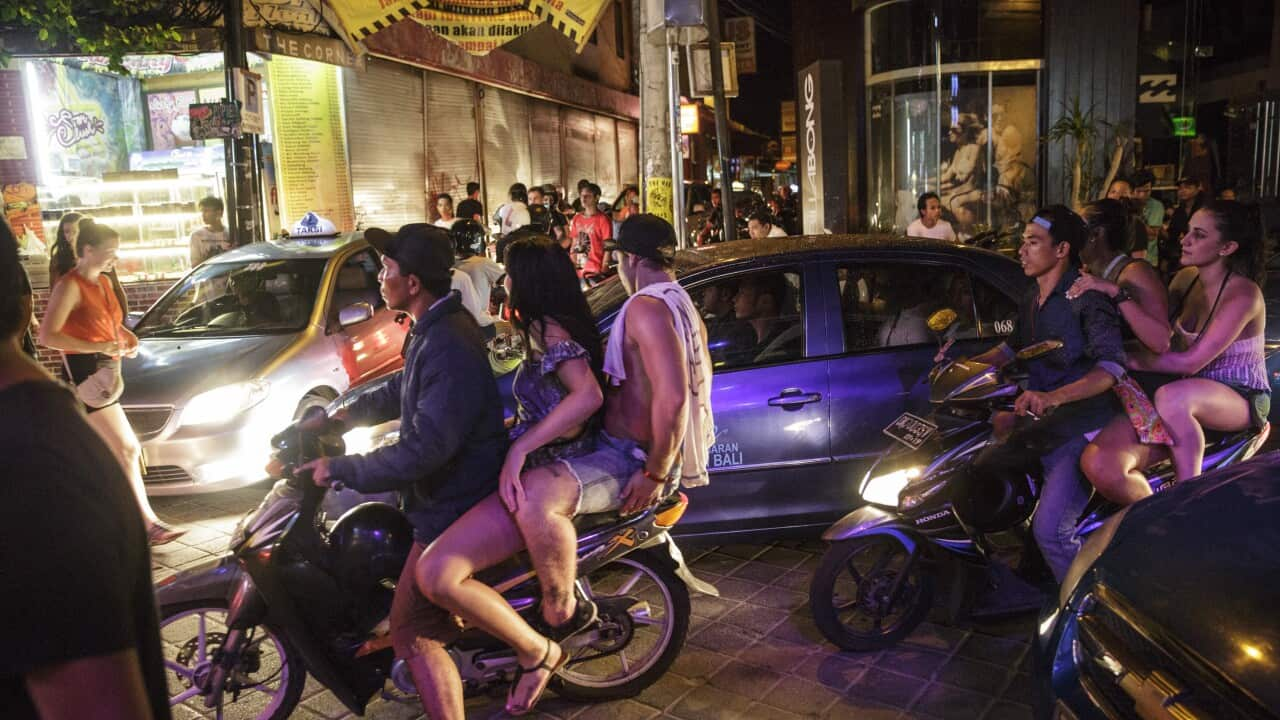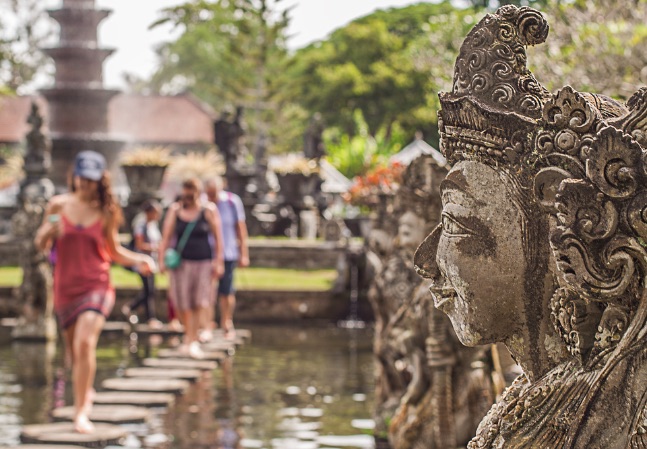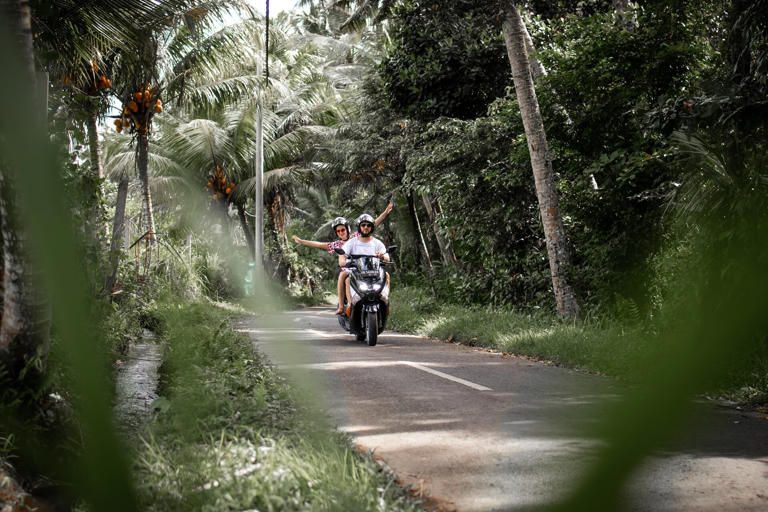

BALI LAWS & STRICT RULES That Will Affect Your Next Trip [UPDATED AS OF JANUARY 2024!]
Bali has recently implemented strict rules and new Bali law for tourists to preserve the sanctity of its cherished traditions. As of July 2023, travelers planning to visit this Indonesian paradise must know the new strict rules to ensure a respectful experience. In this blog, we will walk you through the Bali laws and regulations all tourists must abide by during their stay in Bali. *Update: This blog is updated as of January 2024 to provide the latest insights into Bali tourist tax regulations!

First time in Bali? Check Bali Travel Guide For First Timers (Updated July 2023!)
and Our Top Things To Do In Bali
Bali Law 1. Stricter Tourist Motorcycle Rentals
Bali has always been a popular destination for tourists looking to explore the island’s beauty on a motorcycle. Following the recently announced strict rules and Bali laws, tourists can only hire motorcycles from businesses formally registered with the relevant trade agencies or the transportation renting association in Bali.

Gone are the days when tourists could casually rent motorcycles from guesthouse owners, or unregistered rental operators. To legally rent a bike, tourists must approach licensed rental companies, which have undergone proper scrutiny and verification processes. Additionally, tourists must possess an international driving license that explicitly covers them for riding motorcycles.
The reason behind these strict rules is a rising concern over foreign tourists’ reckless behavior on the roads. There have been incidents of tourists flouting traffic regulations, riding motorcycles without helmets, and even without a valid driving license. These dangerous practices put tourists at risk and pose significant dangers to other road users and locals.
Despite these strict regulations, tourists can still rent motorcycles in Bali with a valid international driver’s license, but only from registered and licensed businesses. Stay safe and responsible while exploring the island!
Bali Law 2. Cohabitation Between Unmarried Couples
Recent changes in Indonesia’s legal landscape have imposed new strict rules and Bali laws on unmarried couples from cohabitating or engaging in sexual relationships. The legislation primarily targets Indonesian citizens, aiming to uphold “Indonesian values” within the country.
Notably, tourists visiting Indonesia won’t face charges under this law. This allows them to stay together even if unmarried without any legal repercussions, and they will not be required to show a marriage license.

With the assurance that tourists won’t face charges under the law, Bali remains an inviting destination. However, it remains essential for both citizens and tourists to be aware of these significant changes in Indonesian and Bali law and respect local customs and norms during their stay.
Bali Law 3. Restricted to Licensed Accommodations Only (No Unlicensed Airbnb or Guesthouses!)
Under the updated strict rules, tourists can only stay at registered hotels and villas. This means that accommodations must be officially recognized and approved by the relevant authorities in Bali.
Staying at unregistered places, such as unlicensed Airbnb rentals, guesthouses, or B&Bs, is strictly prohibited. Violation of this Bali law and regulation can lead to serious consequences, as authorities may conduct investigations and carry out raids to enforce compliance.
Check out our recommended 5-day Bali itinerary !

The reason behind this Bali law is to crack down on accommodations that do not pay the required taxes. By limiting tourists to registered hotels and villas, the government aims to ensure that all businesses operating in the hospitality sector contribute their fair share of taxes.
For a memorable experience, we highly recommend checking out AYONA VILLA and THE PURIST VILLAS RESORT & SPA . Not only are these accommodations known for providing exceptional stays, but they are also registered and licensed, ensuring a worry-free and delightful trip in Bali.
Strict Rule 4. No Tourism Activities in the Mountains and Volcanoes (Yet To Be Imposed)
The government is planning to impose a new Bali law for a complete ban on tourism activities in Bali’s mountains and volcanoes. This prohibition will encompass all 22 peaks on the island, including popular trekking destinations like Mount Batur.

The decision to implement this ban comes as a response to foreign tourists misbehaving and disrespecting the locals and the sacred mountains. Last May, a German woman was arrested for stripping naked and disrupting a Balinese dance show in Ubud. An incident involving a Russian tourist posing nude on a sacred 700-year-old banyan tree is just another example of such disrespectful behavior.
Another case involved a tourist baring his butt on Mount Agung, an act seen as an insult to the mountain’s spiritual significance. Such actions have provoked outrage among locals, who consider these mountains to be inhabited by Gods and hold them in deep reverence.
The ban, if implemented, is expected to be permanent and will apply to all recreational activities in these revered natural landscapes. However, certain exceptions will be made for religious ceremonies, disaster management, and special activities not intended for tourism.
Check out our Top Instagrammable Places in Ubud!
Strict Rule 5. Bali Tourist Tax (Updated as of January 2024!)

As tourism continues to thrive in Bali, the government is taking proactive measures to promote responsible behavior among tourists. Recently, Bali’s Governor announced the introduction of a $10 tourist tax, which is expected to take effect in mid-2024. The tax will be a one-time fee that foreign visitors must pay electronically upon arrival to the island.
*Update: Effective February 14, 2024, in accordance with Bali law, tourists planning a trip to Bali are required to pay IDR 150,000 or USD 10 before entering the province. It’s important to note that certain individuals, such as Diplomatic and official visa holders, Conveyance crew, KITAS/ KITAP holders, family unification, golden and student visa holders, as well as specific non-tourist visa holders, are exempted from the tourist tax with advance application up to one month ahead.
To facilitate the payment process, a variety of options are available, including:
- QRIS payment on LOVE BALI website
- Bank transfer
- Virtual account
- Mobile application (soon available on Google Play and Apple App Store
Alternatively, payment can be made upon arrival at either I Gusti Ngurah Rai Airport or Benoa Bali Harbor. However, it is strongly advised to pay online prior to arrival to streamline the process and enhance convenience.
Bali Law 6. Behave Respectfully or Risk Being Deported
Respecting local customs and cultural norms is paramount when traveling to any destination, and Bali is no exception. The island’s rich cultural heritage and deeply held religious beliefs call for visitors to be mindful of their attire and behavior, particularly when visiting holy places, tourist attractions, and public areas.

Recently, there have been unfortunate incidents involving foreign tourists who displayed inappropriate behavior, including posing naked for social media photos at sacred sites and even walking naked into a Bali temple. Such actions have offended the local community and disrespected the sanctity of these revered locations, leading to immediate deportation for those involved.
To ensure a positive and respectful experience in Bali, tourists are urged to wear polite, reasonable, and appropriate clothing when visiting public spaces, tourist attractions, or holy places.
Also read: Guide to Tegalalang Rice Terrace in Ubud
Strict Rule 7. Working/Overstaying Without Proper Permit (Fines up to USD 60+ per day!)

Foreign tourists in Bali must have the necessary identity documents and valid stay permits. Whether traveling for vacation or work, having the correct permits is essential to avoid legal issues. If you overstay or work without a permit, you can be fined up to Rp. 1 million (roughly USD 60+) per day, face deportation, or even be blacklisted from future entry!
Tourists can apply for Visa on Arrival or B211A Visa to extend their stay in Bali. While Bali welcomes tourists from various backgrounds, it is crucial to remember that we are guests in this beautiful land.
Strict Rule 8. Total Island Lockdown, No Leaving Accommodation on Nyepi – Including Tourists!
Nyepi, also known as the “Day of Silence,” is one of the most important religious holidays in Bali, observed by the Balinese Hindus with great reverence and devotion. During Nyepi, the island enters a period of complete silence and self-reflection. Various rituals and ceremonies mark the day, and the Balinese retreat into a meditative state, abstaining from activities that may disturb the day’s tranquility.
For tourists visiting Bali during Nyepi, it is essential to understand and respect the significance of this religious holiday. During this time, tourists are not allowed to roam or leave their accommodation, just like the locals. This restriction intends to honor the occasion’s solemnity and create an atmosphere of introspection and spiritual contemplation across the island.

In the past, there have been unfortunate incidents where tourists did not fully grasp the significance of Nyepi and attempted to venture out during the Day of Silence. Such actions have led to clashes with locals, as the disruption of this important cultural event is profoundly offensive and disrespectful to the Balinese people.
To avoid misunderstandings or conflicts, tourists are urged to abide by the rules and customs of Nyepi. It is recommended to purchase necessary food supplies and plan for a quiet day indoors, embracing the spirit of reflection and meditation that the day represents.
Bali Law 9. Payments Using Indonesian Standard QR Codes / Rupiah Currency Only
Using cryptocurrency or violating other payment provisions will result in firm actions. It is crucial to transact in rupiah currency and abide by local payment methods.

Read our 5 must-try vegan dishes in Bali.
Strict Rule 10. Compulsory Guided Visits to Tourist Attractions
Based on our experience during our latest trip to Bali in July 2023, we did not observe strict enforcement of the requirement for tourists to be accompanied by licensed tour guides when visiting tourist attractions. We were able to visit various places without the presence of a licensed tour guide, and there were no issues in doing so.
However, we acknowledge that having licensed tour guides can still add significant value to a tourist’s experience. Licensed tour guides possess in-depth knowledge of Balinese culture, history, and traditions. This allows them to offer valuable insights and enrich the overall travel experience. Additionally, they can play a crucial role in promoting responsible and culturally sensitive tourism practices.

An essential aspect to consider is transportation, especially in areas where certain forms of transportation, like rideshare services, might be restricted. Hiring a licensed tour guide can be particularly beneficial in such situations, as they can arrange for transportation, ensuring a smooth and convenient travel experience.
Read our 10 Must-See Temples in Bali!
Strict Rule 10. Rideshare Services Strictly Prohibited in Designated Bali Areas
When it comes to using ride-sharing services in Bali, it’s crucial to note that not all areas permit their operation and strict rules. Certain locations, including airport pickups, Ubud, Canggu, and select spots in Seminyak, strictly prohibit ride-sharing services. These restrictions have been put in place to manage traffic, and support local transportation businesses.

Tourists relying on ride-sharing apps for transportation should be aware of these limitations and plan accordingly. In areas where ride-sharing is not allowed, alternative transportation options such as taxis, private drivers, or rentals are readily available to ensure seamless travel experiences while adhering to local regulations.
Here are some additional strict rules and new laws in Bali that tourists must adhere to:
- Exchange currency at authorized money changers to avoid scams and ensure fair exchange rates.
- Avoid entering the main prayer areas except for worship and reflection.
- Do not climb sacred trees.
- Avoid littering and pollution.
- Minimize single-use plastics.
- Always show respectful behavior.
- Avoid engaging in illegal activities.
By adhering to these strict rules and Bali laws, tourists can contribute to a positive and respectful travel experience in Bali while helping to preserve the island’s unique charm and cultural heritage. Responsible tourism ensures that visitors and locals can continue to enjoy the beauty and spirit of Bali for generations to come.
Happy traveling,
Sue & Renesh
WHERE TO STAY IN BALI
Luxury Romantic Villa – AYONA VILLA : A luxurious in the heart of Seminyak, Bali. Ayona Villa features a private pool, lush gardens, and modern amenities, providing the perfect setting for a relaxing vacation. It’s tranquil atmosphere and comfortable facilities make it an ideal choice for travelers seeking a peaceful and rejuvenating stay. Find the latest prices for Ayona Villa here .
Luxury Romantic Villa – THE PURIST VILLAS RESORT & SPA : Experience serenity where you can indulge in private villas equipped with contemporary facilities, surrounded by lush gardens and a rejuvenating spa. The resort provides traditional Balinese activities like rice field trekking and cooking classes. Find the latest prices for The Purist Villas Resort & Spa here .
You can check out here for the best budget hostels in Bali.
For other places to stay in Bali, click here for a list and the latest prices.
OUR MUST-HAVE BALI TRAVEL ESSENTIALS
Compression Packing Cubes – BAGSMART Travel Organizer Compression Packing Cube Sets are perfect for the over-packer – I try to pretend I’m not, but I’m really only kidding myself. These are perfect for making sure you get all the clothes you want to look cute for every possible occasion on your holiday getaway!
Elastic Sleeves for Leak Proofing Travel – TRANOMOS 8 Pack Elastic Sleeves Silicone Bottle Covers are a lifesaver for leak-proofing travel, and really even for your everyday life. Just pop them over a bottle and no more leaks. I wish I knew about these earlier, would have saved me countless wasted sunscreen, toner, serums, aloe, the list is long! Pro-tip – They work better for slightly smaller-sized bottles and non-pump-type bottles.
Anti-Theft Messenger Bag – Anti-Theft Classic Essential Messenger Bag is the perfect solution to keep your belongings secure while exploring a new city. With its slash-resistant body and lockable zippers, this bag protects your essentials from pickpockets and thieves.
Waterproof Bag – HEETA Waterproof Dry Bag is a game-changer for any adventurer looking to keep their belongings dry and secure during any water activity. The durable and lightweight design allows you to easily store and carry all your essential items while enjoying any water-based adventure. Whether kayaking, fishing, island hopping, or just lounging at the beach, HEETA has got you covered!
MORE ON TRAVEL TIPS
TRAVEL LIKE A LOCAL: INSIDE TIPS FOR EXPLORING SOUTHEAST ASIA
20 THINGS WE WISH WE KNEW BEFORE TRAVELING TO BANGKOK
SUSTAINABLE TRAVEL TIPS
LONG-HAUL FLIGHT TIPS
MALAYSIA INSIDER TIPS: WHAT LOCALS WANT YOU TO KNOW BEFORE TRAVELING TO MALAYSIA
KUALA LUMPUR TRAVEL GUIDE FOR FIRST-TIMERS
A GUIDE TO VISITING MALAYSIA DURING RAMADAN
TIPS FOR ISLAND HOPPING IN THAILAND
KOH LIPE TRAVEL INFORMATION FOR FIRST-TIMERS
ULTIMATE BALI TRAVEL TIPS FOR FIRST TIMERS
* Disclaimer: As an Amazon Associate I earn from qualifying purchases. Some links included in this description are affiliate links. If you purchase a product or service with the links that I provide I may receive a small commission. There is no additional charge to you! Thank you for supporting my blog so I can continue to provide you with free more each week!
LIKE THIS? PIN IT FOR LATER!

You may also enjoy:
Siem reap tips: things we wish we …, best vegan restaurants in seminyak, bali, cool free things to do in barcelona, kanchanaburi day trip from bangkok (2023 travel guide).
These new rules sound fair. It’s sad that some of them has to be put in place to understand respect.
Yes! We totally agree! And if you’re respecting culture, customs and laws while traveling, these new rules won’t really affect how you experience Bali.
Leave a Reply Cancel reply
Your email address will not be published. Required fields are marked *
Notify me of follow-up comments by email.
Notify me of new posts by email.
Follow on Instagram

Discover the Exquisite World of Art at Feliz’Eye: A Must-Visit Art Gallery in Ubud
- 11 months ago
- December 16, 2023
Looking Back to Bali’s New Tourist Rules 2023: Do’s & Don’ts For Travellers!
Share This Post:
As Bali continues to be a global tourist hotspot, the provincial government, led by Governor Wayan Koster, has implemented a comprehensive set of regulations aimed at shaping a new paradigm for foreign tourists on the Island of the Gods. Through Gubernatorial Circular No. 4 of 2023 , effective from May 31, 2023, tourists are now subject to 12 obligations and 8 prohibitions, ushering in a new era of responsible and culturally sensitive tourism.

Tourist Obligations (Do’s):
- Respect for Sacred Sites: Tourists are required to show reverence for the sanctity of puras (temples), pratimas (religious icons), and other sacred religious symbols.
- Adherence to Traditions and Culture: A sincere respect for local customs, traditions, arts, and culture, as well as the wisdom of the Balinese community during ceremonies and rituals, is mandatory.
- Appropriate Attire: Tourists must wear modest and appropriate clothing when visiting sacred areas, tourist attractions, public places, and during activities in Bali .
- Polite Behavior: Maintaining polite conduct in sacred areas, tourist spots, restaurants, shopping areas, roads, and other public spaces is emphasized.
- Guided Tours: Tourists are required to be accompanied by licensed tour guides who possess knowledge of Bali’s natural conditions, customs, traditions, and local wisdom when visiting tourist attractions.
- Currency Exchange at Authorized Points: Foreign currency exchange must be conducted at authorized money changers, both banks and non-banks, displaying the necessary permits and QR codes from Bank Indonesia.
- QR Code Payments: Payment transactions are to be made using the Standard Indonesian QR Code.
- Currency Transactions in Rupiah: All transactions are to be carried out using the Indonesian Rupiah.
- Compliance with Traffic Rules: Tourists must adhere to Indonesian traffic regulations, including possessing a valid International or National Driving License, following traffic rules, wearing appropriate attire, using helmets, obeying traffic signs, and not exceeding passenger capacities. Additionally, driving under the influence of alcohol or illegal substances is strictly prohibited.
- Use of Official Transportation: Tourists are encouraged to use officially recognized four-wheeled or two-wheeled transportation services.
- Accommodation at Licensed Establishments: Staying in accommodation businesses with valid permits is obligatory.
- Adherence to Specific Regulations: Tourists are required to comply with all specific regulations applicable to each tourist attraction and activity.
Prohibitions for Foreign Tourists (Don’ts):
- Entry into Sacred Places: Foreign tourists are prohibited from entering utamaning mandala and madyaning mandala, sacred or sanctified places, except for prayer purposes while wearing Balinese traditional attire or for religious ceremonies when not menstruating.
- Climbing Sacred Trees: Climbing sacred trees is strictly forbidden.
- Disrespectful Behavior in Sacred Places: Any behavior that desecrates sacred places, including climbing sacred structures or taking indecent photos, is not allowed.
- Improper Disposal of Waste: Indiscriminate littering and polluting lakes, springs, rivers, seas, and public areas are strictly prohibited.
- Use of Single-Use Plastics: Tourists are not allowed to use single-use plastics, including plastic bags, styrofoam, and plastic straws.
- Inappropriate Language and Behavior: Use of offensive language, disrespectful behavior, causing disturbances, and acting aggressively towards authorities, the government, local communities, or fellow tourists, either directly or indirectly through social media, is strictly prohibited.
- Engaging in Business Activities Without Proper Documentation: Tourists are prohibited from working or engaging in business activities without proper documentation issued by authorized agencies.
- Involvement in Illegal Activities: Participation in illegal activities, including the trade of illegal items such as flora and fauna, cultural artifacts, and sacred objects, as well as the sale and purchase of illegal drugs, is strictly forbidden.
Sanctions for Violators:
Governor Koster emphasizes that foreign tourists who violate these regulations will face strict sanctions or legal processes according to Indonesian laws and regulations. The government urges all stakeholders to earnestly understand, implement, and disseminate these regulations to all their personnel and foreign tourists visiting Bali.
Additionally, Governor Koster calls upon tourism service providers and the Balinese community to refrain from facilitating the misconduct of foreign tourists. He emphasizes the collective responsibility to uphold the good name and image of Bali’s tourism, fostering a cultural, quality, and dignified tourism environment.
Looking Back at the New Rules in 2023
As the calendar turned to 2023, Bali witnessed a myriad of behaviors from foreign tourists that raised concerns about rule violations and the sanctity of worship places on the island. In response, the Directorate of Traffic (Ditlantas) of the Bali Regional Police recorded a significant number of traffic violations, with a notable portion attributed to foreign tourists. Notably, around 147 out of 367 traffic violation cases involved tourists, particularly for not wearing helmets and improper vehicle registration.
In addressing these challenges, the Bali government, under Governor Wayan Koster’s leadership, issued Gubernatorial Circular No. 4 of 2023. This circular outlines a framework for the conduct of foreign tourists in Bali, encompassing rules for places of worship, tourist attractions, public spaces, business activities, traffic, and general behavior. To enforce these regulations, the Bali government established a task force called the Acceleration Team for Tourism Governance, comprised of personnel from the Bali Tourism Agency, the Police, Civil Service Police Unit (Satpol PP), Immigration, Prosecutors, and tourism associations.
Circular Regulations:
The circular, effective from late May 2023, introduces obligations and prohibitions to be adhered to by foreign tourists. It covers various aspects, including rules for places of worship, tourist sites, public areas, business, traffic, and behavior.
Retribution Rules from July 2023:
Governor Koster announced plans for a retribution fee for tourists entering Bali , expected to be implemented in 2024. While the exact amount was not finalized at the time of the announcement, it was tentatively set at Rp 150,000 per person. This fee, collected electronically, would be applicable to all entry points for tourists, whether by land, sea, or air. The funds collected would be utilized for the protection of culture, the environment, infrastructure, and tourism facilities in Bali.
Official Implementation in February 2024:
In September 2023, the government officially confirmed that the retribution fee of Rp 150,000 for foreign tourists in Bali would be enforced starting February 14, 2024. This decision was formalized in Regional Regulation No. 6 of 2023, Article 19, concerning Levies for Foreign Tourists for the Protection of Balinese Culture and the Environment. Concurrently, the Bali Provincial Government released guidelines for the payment of this retribution by tourists.
In conclusion, Bali’s proactive approach to address tourist-related challenges signals a commitment to responsible tourism. The success of these regulations will depend on how well they are communicated, enforced, and integrated into the broader vision of Bali as a cultural and environmentally conscious tourist destination. As travelers adapt to these changes, the coming years will reveal the effectiveness of these measures in shaping Bali’s tourism landscape.
Related Posts

Extreme Weather Strikes Bali, Urgent Warning Issued for Residents and Tourists
- 3 weeks ago

Tourist Couple, Including Australian Woman, Killed in Bali Landslide Tragedy

The 40$ Million Hidden City Ubud Development: A Threat or an Opportunity?
- 2 months ago

Bali Government Sets Entertainment Tax Rates at 10-15% Amidst Controversy

2.2 Billion IDR Generated in First Week of Bali Tourist Levy: Promoting Sustainable Tourism in the Island Paradise

Bali’s New Tourist Police: Now With Friendly Dogs, Ensuring Safe and Pleasant Travels
Events in bali, subscribe to our weekly newsletter.
No spam, notifications only about new updates.

- No comments yet.
Add a comment
Leave a reply · cancel reply.
Your email address will not be published. Required fields are marked *
© 2022 All rights reserved
Made with ❤ with Elementor
- SIMCards / eSIMS
Staying in Bali for more than just a holiday
- Animal Welfare
- Green Traveling

Hotels, Resorts, Villas & Holiday Rentals

Bali's no. 1 Travel Guide
Don't Forget:
Things to Do in Bali
With our BaliCard, Bali's Digital Discount Card & Tourist Pass, you save 10% and more
What's on Bali

Events at W Bali Seminyak

Events at Desa Potato Head

Events at AYANA Bali
Bali Travel Regulations, Tourist Tax & Entry Requirements
Faq, tips & must-know when coming to bali.

Indonesia Travel Regulations, Entry Requirements and Bali Tourist Tax
Planning your trip to Bali? The following FAQ will guide you through the general regulations that apply to all INTERNATIONAL travelers. We will clarify:
- General Travel Requirements
- Customs Declaration for Indonesia
- Bali Tourist Tax
- Passport Requirements
….and some essential travel tips.
Note: Don’t forget
- Visa Regulations for Bali / Indonesia
- how to get through the airport when arriving at Ngurah Rai International Airport
Essentials for your Bali Vacation
- Digital Discount Card - The BaliCard
- SIMcards & e-Sims online (NEW)
- International Driving License (mandatory)
- Hotels, Resorts and Villas in Bali
- Trekking Tours & Sightseeing
- Car Rental with Driver (half- & full day)
- Airport Transfer DPS
- Bali Scooter & Motor Bike Rental
- Medical Travel Insurance (incl. Covid coverage)
- Golf Tee Time
Updated travel regulations and requirements for Bali / Indonesia & tips before you arrive
Faq - must know before arriving in bali.
Yes, you need a Visa for traveling to Bali, unless you are a national of one of the 9 ASEAN countries or Timor Leste.
For tourists and standard visits (not working) there are two Visas available. Which Visa depends on your nationality, travel purpose and length of stay. Please click on the button below to check what applies to you.
- Passport, needs to be valid at least 6 months from day of arrival. No exceptions, they will send you back otherwise! Make sure your passport is valid.
- The passport needs to have at least one empty page .
- The passport must be in good condition. Ripped or very run down passports might get refused. There are travelers who were denied entry into Indonesia and were sent back, because the passport was in bad condition
Passport Requirements Details
Yes you need a return ticket.
You might not have to show it at the immigration counter, but it could happen. .
- Return ticket - airlines and also the immigration authorities can insist that you have a return ticket that is within the time-frame of your visa validity,
- Fill in the ONLINE Customs declaration Form arriving in Bali: if you are arriving in Bali you can do it online and SAVE TIME AT THE AIRPORT, fill in the form BEFORE you arrive. This is the link to the online form: E-CD (Electronic Custom Declaration )
- The form can be filled in 72h before your arrival. Not earlier.
- After filling in the online form, you will receive a QR code which will be scanned by officers after you have collected your luggage, just before you exit the airport building
Don't bring more than the equivalent value of IDR 100,000,000 cash into the country (ca. AUD 10,000). Otherwise you have to declare and pay taxes.
The new tourist tax is effective since 14th February 2024 (Tourist Levy for INTERNATIONAL visitors)
- The Fee is IDR 150,000 per person (ca. USD 10 and AUD 15)
- The tourist tax (levy) is a local tax that the Bali administration government implemented. It is only related to Bali and not to Indonesia
- Be careful about Scammer sites, which mushroomed since the tax has been introduced.
For the official tax payment link and more information on who has to pay, exemptions please click below:
Yes. This is now a MANDATORY Requirement
- Bring your international drivers license (f you wish to rent a scooter). If you don't have one and can't get it in your home country you can get a digital or printed version (delivered in Bali) here from our accredited partner in Singapore:
Order your International Driving License / Driving Permit (IDP) copy online here
Yes you can order a simcard for bali online..
Our partner provides eSIM and Physical SIMcards (can be collected at the airport), which you can order online. Like this you will be able to connect to the internet quickly.
Get a SIMcard with Internet connection (physical or eSIM). Order Online
If you purchase out Digital Discount Card for Bali, our BaliCard, you will get a FREE 1GB SIMcard for free to test, which you can then top-up as you go.
BALICARD & Free SIMcard
A medical travel insurance is not mandatory anymore..
But it's advisable to have one. Accidents do happen in Bali and if you are not properly insured, hospitals and doctors will ask for cash payment and can deny treatment.
Don't have a medical travel insurance?
Get your medical travel insurance for Bali / Indonesia and beyond online
International Travel Insurance / Nomad Insurance / Medical Travel Insurance for 4 weeks or longer.
Info, Prices & Signup
YES. Bali (Airport Denpasar DPS) is very well connected internationally.
Plenty of budget and international carriers are operating flights to Bali but not all airlines are back to the full schedule compared to pre-covid.
It can be significantly cheaper, depending on the season you intend to travel.
If you can't get a flight to Bali, or if it is too expensive for you, you can look into the option to book a flight to Jakarta and then take a domestic flight on the same day to Bali. Airlines such as Citilink, Batik Air, Air Asia, Lion Air, and Garuda are flying to Bali several times a day. Ticket price one way: 50-150USD.
If you choose to travel to Jakarta first, tt's good to at least have 3 or 4h difference between your arrival in Jakarta and the next flight to Bali. Because you would have to go through immigration, pick up your luggage and then go to the terminal for to catch your domestic flight.
NO. All requirements have been lifted.
As of 9th of June 2023, travelers do NOT need to show proof of vaccination anymore. However the Indonesian government "suggests" to be fully vaccinated.
Link to the official statement from the government (in Bahasa Indonesia).
- Visa & Entry Regulations
- Bali DISCOUNT Card
- Hotels, Resorts, Villas
- Buy SIMCards & eSim
- Int. Driving License (mandatory)
- Airport Shuttle
- Scooter & Bike Rental
- Car Rental & Driver
- Reliable Medical Insurance
- Destinations | Where to Stay
- Going Out & Nightlife
- Weather & Seasons
- Complete Travel Guide
- Weddings & Getting Married
- Things to Do
- What’s-On Calendar
- Events @ W Bali
- Events @ Potato Head
- Events @ Rock Bar
- Living in Bali
No products in the cart.
Return to shop
Username or email address *
Password *
Remember me Log in
Change Location
Find awesome listings near you.
Badly behaved in Bali: Here are the new rules for Australian tourists on appropriate behaviour
A balinese religious leader is calling on foreign visitors to show more respect for local customs after a string of incidents prompted authorities to issue “how to behave” guidelines..

The Bali Tourism Office recorded foreign tourist visits to Bali in the first quarter of 2023 reaching 1.4 million people. Source: AAP / Made Nagi
- Bali has introduced new 'how to behave' guidelines, which will be issued to tourists upon arrival.
- Visitors are urged to dress appropriately, behave at religious sites, and respect local customs and culture.
- The new measures follow a string of incidents among travellers visiting the Indonesian island.
What are the new rules for tourists in Bali?

Why Australians could soon be banned from getting around Bali on a motorbike

What are visitors to Bali doing wrong?

Australians visiting Bali will need to be wary of Indonesia's extramarital sex ban. Here's why

Russian tourist deported from Bali over 'indecent' act at sacred site
Share this with family and friends
Recommended for you

The unexpected cost that could add $500 to your Bali trip
Vaccination

See the list: Flights where you're most (and least) likely to have an empty seat next to you
Travel and tourism

Clock is ticking: The Australian island facing an uncertain future
Immigration policy

A new scam is circulating in Australia. One couple has lost more than $800,000
Get sbs news daily and direct to your inbox, sign up now for the latest news from australia and around the world direct to your inbox..
Morning (Mon–Fri)
Afternoon (Mon–Fri)
By subscribing, you agree to SBS’s terms of service and privacy policy including receiving email updates from SBS.
SBS World News
- My Favourites
- Destinations
What you need to know about Bali's new tourist rules
From a ban on climbing volcanos to new guidelines around renting motorbikes and accommodation, Bali has announced a new set of dos and don’ts for tourists.
This article may contain links from our affiliate and advertising partners. When you click on them, or share this content, we may earn a commission. Learn more

Woman banned from Bali over big scam

‘Stay alert’: Urgent warning for Bali tourists

Dad breaks big Bali rule, refused entry
For a start, don't be nuding up.
Last week, a video circulated on social media that enraged the local and expat community in Bali. In front of shocked onlookers, a young, naked female tourist ascended the stairs of a temple during a Balinese cultural dance and forcibly pushed through a carved door. After being confronted by a Balinese man in ceremonial dress, she paraded back down the stairs, arms held out to her sides in victory with a smug expression on her face, before kneeling at a statue in ‘prayer’.
Regardless of whether it was desperate attempt at notoriety or mental illness, it was one of the most sickening displays of cultural disrespect I have ever seen. It is a stain on visitors in Bali and I felt deeply embarrassed for the locals that were there to witness her total disregard for their culture and the loss of dignity they must have endured in that moment. It’s this growing sense of entitlement, the latest in a string of incidents in Bali, that is driving a broader discussion around the future of tourism on the island.
After a spate of events involving tourists from Australia, Russia, the UK, US and Europe, it's clear that Bali wants to clean up its image. Or should I say, that of its guests. From making a mockery of sacred sites to drunken behaviour and disregard for road safety, authorities in Bali have had enough and are putting their foot down. Last week, Bali’s Governor Wayan Koster announced a comprehensive list of guidelines for tourists to follow in Bali, which are to be printed on a card for easy reference and handed out to passengers arriving at Denpasar international airport.

The 12 ‘dos’ and eight ‘don’ts’ have been designed to educate travellers as well as help them avoid prosecution and penalties while in Bali. Many of the guidelines are not actually new and reiterate laws that are already a part of Indonesia’s constitution, such as complying with traffic laws, holding a valid license or adhering to lawful behaviour in sacred sites and towards authorities and the government.
Alongside these basic measures, Governor Koster has issued a landmark ban on climbing all 22 mountains and volcanos in Bali with immediate effect. Mountains are considered the most sacred places in Balinese culture and after a series of deaths and incidents involving influencers stripping naked on social media, tourists will no longer be allowed to climb them. This new law also applies to locals and tour guides ascending Mt Batur and Mt Agung, which have been part of the island’s tourism offering for decades. Part of a wider plan to embrace sustainability, it’s a move in the right direction, but will likely leave many locals unemployed.
More Coverage

The new tourism policy also states that travellers should refrain from using single-use plastics and littering, can only hire scooters or motorbikes from a licensed operator or stay in accommodation with the required permits. It’s not clear how these will be implemented and if the past is any indication, authorities may have bitten off more than they can chew. However, what Bali needs to do now is put their money where their mouth is. The only way to tackle disorderly, disrespectful conduct is to take a zero-tolerance approach and show tourists that bad behaviour has real repercussions, such as deportation. In the last few days, Governor Koster has also announced an urgent review on the visa on arrival.

There’s a worrying attitude that has been growing among tourists to Bali, a sense of entitlement and recklessness that is impacting the local community and giving those of us who love and respect the island a bad name. It's hard to put a finger on why tourists behave this way when they arrive to the Island of the Gods. What is it about Bali that makes people think they can do what they like? India and Japan both have numerous spiritual and cultural sites, but you don’t hear about foreigners humiliating their culture or desecrating temples.
Bali has attracted a younger, more free-thinking demographic of traveller in recent years, as well as influencers whose lives play out on social media. They’ll go to any length for more likes. Perhaps Bali needs to put its foot down on this type of activity, stop promoting the island and its venues as props for social media and start focusing on authentic experiences that appeal to the thoughtful, more considered tourist. Kindness is in the bones of the Balinese. But It’s time for some tough love.
Aussies have been warned about a Bali scam after a woman was deported for committing the act on ATM machines across the island.
Aussies who are currently holidaying in Bali or plan to visit the holiday hotspot have been given a warning for the next few days.
A tourist in Bali has been captured on film being refused entry into a sacred site after breaking a simple rule.

I got caught overstaying my visa in Bali
Thinking of overstaying your Indonesian visa? Read this first.
- Skip to main content
- Skip to primary sidebar
- Skip to footer
- Newsletters
Bali issues 12 dos and 8 don’ts for tourists

Brace yourself, folks in paradise. It’s about to get real for foreign tourists roaming the island as Bali Governor Wayan Koster has dropped the administration’s official dos and don’ts guidelines.
Issued in Circular (SE) from the Governor of Bali Number 4 of 2023, the new guidelines were announced during a press conference at the Bali Governor’s Office today, laying down the law for tourists venturing into Bali’s magical realm.
Let’s break it down for you, Coconauts. Here are the do’s and don’ts for our international travelers:
- Respect the sanctity of temples, pratimas (sacred statues), and religious symbols;
- Wholeheartedly respect the customs, traditions, arts, culture, and local wisdom of the Balinese people during ongoing ceremonial processions and rituals;
- Dress modestly, appropriately, and respectfully when visiting sacred areas, tourist attractions, public places, and engaging in activities in Bali;
- Behave politely in sacred areas, tourist areas, restaurants, shopping areas, roads, and other public places;
- Be accompanied by licensed tour guides (who understand the natural conditions, customs, traditions, and local wisdom of the Balinese people) when visiting tourist attractions;
- Exchange foreign currency at authorized money changers (both banks and non-banks) that are officially licensed and display the authorization number and QR code logo from Bank Indonesia;
- Make payments using the Indonesian Standard QR Code (QRIS);
- Conduct transactions using the Indonesian rupiah;
- Comply with the applicable traffic laws in Indonesia, including possessing a valid international or national driving license, obey traffic rules, dress modestly, wear a helmet, follow traffic signs, not exceed passenger capacity, and no driving under the influence of alcohol or illegal drugs;
- Use four-wheeled transportation that is roadworthy and officially registered or two-wheeled transportation that is operated by a legal business entity or association for two-wheeler rentals;
- Stay in accommodations that possess the required permits according to applicable regulations;
- Adhere to all specific provisions/rules that apply to each tourist attraction and tourist activity.
- Trespass sacred territories: Steer clear of utamaning mandala and madyaning mandala , holy and sanctified spots like puras and pelinggihs — unless you’re there for a Balinese traditional ceremony, during which you must wear the appropriate attire, and you’re not menstruating;
- Touch sacred trees;
- Engage in behavior that defiles sacred places, temples, idols, and religious symbols, such as climbing sacred structures and taking indecent or nude photos;
- Litter and pollute lakes, springs, rivers, seas, and public areas;
- Use single-use plastics like plastic bags, polystyrene (styrofoam), and plastic straws;
- Utter offensive words, behave disrespectfully, cause disturbances, and act aggressively towards government authorities, local communities, and fellow tourists, both directly and indirectly through social media, including spreading hate speech and hoaxes;
- Engage in work or business activities without proper documentation issued by the relevant authorities;
- Get involved in illegal activities, such as trading illegal goods, including endangered flora and fauna, cultural artifacts, and sacred objects, as well as illegal drugs.
Governor Koster made it crystal clear that foreign tourists who dare to break these rules will face severe consequences, including penalties and legal proceedings as prescribed by Indonesian law.
“Everyone should take this circular seriously, implement it, and disseminate it to all their staff and foreign tourists visiting Bali,” emphasized Koster.
He also urged tourism service providers and the Balinese community not to facilitate misbehavior among foreign visitors.
Alright, Coconauts, you’ve been briefed. It’s time to show some respect, soak up the culture, and follow the rules. Bali awaits, and the adventure begins!
Share this post:
Reader interactions, leave a reply cancel reply.
You must be logged in as a Coconuts User to comment.

SUBSCRIBE TO OUR NEWSLETTER
Get the best of Coconuts delivered to your inbox!
BECOME A COCO+ MEMBER
Support local news and join a community of like-minded “Coconauts” across Southeast Asia and Hong Kong.

- Become a Patron
- Advertising
- Announcements
- Editorial Policies
- Grove: Coconuts Brand Studio
Bali tourists to receive 'dos and don'ts' card on arrival as part of crackdown on unruly behaviour
Authorities in Bali will distribute a list of "dos and don'ts" for visitors arriving at the tourist island and are warning they will cancel visas amid a wave of disrespectful tourists.
Key points:
- Bali has seen a string of incidents involving foreign tourists misbehaving, with more than 130 deportations so far this year
- Authorities have will distribute a list of 12 "dos" and eight "don'ts" for international tourists
- The rules will be printed out and given to all arrivals at the airport from June
The move comes in response to a string of incidents involving foreigners behaving inappropriately or breaching visa conditions, with more than 130 deportations in the first five months of this year.
In a circular issued for government departments on the Indonesian island, Governor Wayan Koster signed off on 12 "dos" and eight "don'ts" for international tourists, one week after a video of a naked German woman disrupting a traditional dance performance at a temple went viral.
She was placed in a mental health facility by local authorities, but nudity at holy sites has been a recurring theme, with two Russian bloggers deported in recent months, one for posing nude on a sacred tree and the other for dropping his pants at a volcano regarded as holy by Hindu Balinese.
Now for the first time, climbing holy trees or posing naked at cultural or religious sites is being clearly spelled out as prohibited under guidelines that apply across the whole island.
The governor says the rules aim to restore "quality and dignity" to Bali's tourism sector, which is still recovering after shutting down completely during the COVID-19 pandemic.
Entering certain holy sites for reasons other than praying, behaving disrespectfully at temples and going nude or wearing immodest clothing all make the "don't" list for tourists.
As does acting aggressively or using offensive language towards police and other government workers, partly in response to a viral video of an Australian woman in March who yelled at several policemen who stopped her for riding a scooter without a helmet.
The "dos" list largely follows a similar theme but urges foreigners not to use cryptocurrencies for transactions while in Indonesia, or to flout visa conditions by illegally running businesses.
Tourists are being told to rent scooters and seek tour guide services from licensed operators.
"Because of the Russia-Ukraine war, a lot of people wanting to avoid conscription have come to Asia including Bali and they're not really tourists," Rai Suryawijaya, the deputy chair of the Bali Hotel and Restaurant Association, told the ABC.
"They don't have much money, so after a few days or a month they're out of money and they're doing some illegal activities, so the government is quite worried about that."
While the guidelines fit largely in line with existing laws and cultural norms in Bali, their promotion is seen as an order to step up enforcement by various agencies on the island.
A senior Bali provincial official in charge of immigration said the rules would be printed out and given to all arrivals at the airport starting in June.
Bali's borders were closed to international tourists for about two years due to the pandemic, and more than a year after the reopening, the island is yet to bounce back to pre-pandemic numbers.
Government figures show about 13,000 to 15,000 tourists a day are arriving, down from the peak of 18,000 before COVID-19.
"The economy is getting better and better, but it's not normal yet, so we still have to work hard to improve it," Mr Suryawijaya said.
- X (formerly Twitter)
Related Stories
Bali is fed up with badly behaved russians who fled putin's war. now they're calling for a crackdown.

'No longer allowed to use motorbikes': Bali's governor has had it with badly behaved tourists
January saw a decrease in overseas travel. The latest data suggests numbers won't be low for long
- Law, Crime and Justice
- Travel Health and Safety
- Travel and Tourism (Lifestyle and Leisure)
- World Politics
- SYDNEY, NSW
- MELBOURNE, VIC
- HOBART, TAS
- BRISBANE, QLD
- ADELAIDE, SA
- CANBERRA, ACT
- Watch The Masters golf for free on 9Now
No swearing, touching of sacred trees or climbing structures: Bali's official 'dos and don'ts card' for tourists

- Respect the sanctity of temples, pratimas (sacred statues), and religious symbols
- Wholeheartedly respect the customs, traditions, arts, culture, and local wisdom of the Balinese people during ongoing ceremonial processions and rituals
- Dress modestly, appropriately, and respectfully when visiting sacred areas, tourist attractions, public places, and engaging in activities in Bali
- Behave politely in sacred areas, tourist areas, restaurants, shopping areas, roads, and other public places
- Be accompanied by licensed tour guides (who understand the natural conditions, customs, traditions, and local wisdom of the Balinese people) when visiting tourist attractions
- Exchange foreign currency at authorised money changers (both banks and non-banks) that are officially licensed and display the authorisation number and QR code logo from Bank Indonesia
- Make payments using the Indonesian Standard QR Code (QRIS)
- Conduct transactions using the Indonesian rupiah
- Comply with the applicable traffic laws in Indonesia, including possessing a valid international or national driving license, obey traffic rules, dress modestly, wear a helmet, follow traffic signs, not exceed passenger capacity, and no driving under the influence of alcohol or illegal drugs
- Use four-wheeled transportation that is roadworthy and officially registered or two-wheeled transportation that is operated by a legal business entity or association for two-wheeler rentals
- Stay in accommodations that possess the required permits according to applicable regulations
- Adhere to all specific provisions/rules that apply to each tourist attraction and tourist activity.

Don'ts
- Trespass sacred territories: Steer clear of utamaning mandala and madyaning mandala, holy and sanctified spots like puras and pelinggihs — unless you're there for a Balinese traditional ceremony, during which you must wear the appropriate attire, and you're not menstruating
- Touch sacred trees
- Engage in behavior that defiles sacred places, temples, idols, and religious symbols, such as climbing sacred structures and taking indecent or nude photos
- Litter and pollute lakes, springs, rivers, seas, and public areas
- Use single-use plastics like plastic bags, polystyrene (Styrofoam), and plastic straws
- Utter offensive words, behave disrespectfully, cause disturbances, and act aggressively towards government authorities, local communities, and fellow tourists, both directly and indirectly through social media, including spreading hate speech and hoaxes
- Engage in work or business activities without proper documentation issued by the relevant authorities
- Get involved in illegal activities, such as trading illegal goods, including endangered flora and fauna, cultural artifacts, and sacred objects, as well as illegal drugs.
/https%3A%2F%2Fprod.static9.net.au%2Ffs%2F99632c64-0542-4e71-88b9-5366ad27a08f)
Send your stories to [email protected]
Auto news : Kia's 'worst kept secret' out as ute rumours confirmed.
Top Stories

Flags fly at half mast for Bondi stabbing spree victims

Buildings illuminated for victims of Sydney shopping centre stabbing

How a key Australian ally has helped keep Kremlin's war chest full

Mum, architect, business icon's daughter identified as victims in Sydney stabbing spree
National Geographic content straight to your inbox—sign up for our popular newsletters here

Nudity, sex, and disrespect: Bali looks to rein in bad tourist behavior
Outrageous tourist antics have prompted the provincial government to enact new laws for several sacred sites.
Regular obscene acts by tourists in Bali have prompted the proposal of new rules for visitors, including a ban on climbing its mountains, which are considered sacred and home to Hindu deities. Bali governor Wayan Koster recently sent local officials more than a dozen rules designed to address years of tourist misbehavior on this Indonesian island.
Under his plan, tourists arriving in Bali would receive a document advising them to dress modestly in temples and to avoid touching holy trees, swearing in public, scaling religious buildings, or interrupting Balinese ceremonies. Perhaps the most impactful proposal, however, would be a ban on mountain hiking. This popular tourist activity is promoted by many Balinese companies, which lead tours of majestic peaks and volcanoes.
The governor’s proposal came soon after a German woman walked naked into a Bali temple and a Russian woman posed nude on a sacred banyan tree. In March, meanwhile, a Russian blogger who bared his backside on a volcano became one of reportedly more than a hundred people deported from Bali this year alone.
( Should some of the world’s endangered places be off limits to tourists? )
Although Bali is one of Asia ’s most touristed locations, brimming with resorts, bars, and activities aimed at foreigners, it’s also an island deeply rooted in ancient religious beliefs. Bali is cloaked in sites considered sacred in its Hindu-majority culture.
“In Hinduism the mountains are where the gods live, in particular the Himalayas are associated with specific deities,” says Adrian Vickers , professor of Southeast Asian Studies at the University of Sydney. “So the high mountains and volcanoes of Bali, Java, and Lombok are regarded as versions of those mountains from India . Added to this is the association [in Bali] of high places with ancestors.”
Many tourists don’t understand how deeply they can impact Bali with their actions, says I Nengah Subadra , associate professor of tourism at Bali’s University of Triatma Mulya. Dressing too casually, talking too loudly, or touching someone too intimately at sacred sites disrupts the island’s delicate spiritual balance.
( These are some of Europe’s most sacred sites .)
Such behavior doesn’t just offend locals, it also unsettles Bali’s Hindu gods, he says. To appease these deities, and restore cosmic harmony, Balinese people perform ancient rituals at these disturbed locations, cleansing them of negative energy.
I Nengah Subadra says frustration over tourist misbehavior has been growing in Bali for more than a decade, citing a 2013 incident in which an Estonian couple had sex in a temple. But he says the planned tourist rules will receive a mixed reception from locals. “Some Balinese people who are very pro-cultural preservation, they will be happy,” he says. “But those who work in tourism may be unhappy because it will impact businesses who do hiking tours to mountains.”
Kadek Krishna Adidharma is one such person. Director of Bali Eco Trekking , which has led mountain tours for 24 years, he says Bali’s governor has no right to ban tourists from visiting its peaks. “Whether a mountain or volcano is open to tourism is a matter for local, not provincial, authority,” he says.
“We have not seen any changes on the ground since the arbitrary rule set by the governor. With 2024 being an election year, some also see this as an attempt by the governor to flex and demonstrate his power to do something about inappropriate behavior by some tourists.”
( Go beyond Everest, with these 9 epic peaks to conquer in a lifetime .)
Although it’s not yet clear when Bali’s proposed tourist rules will be enforced, travelers can show respect when visiting mountains and temples by dressing conservatively and heeding local customs.
FREE BONUS ISSUE
Related topics.
- LAW AND LEGISLATION
- LAW ENFORCEMENT
- MOUNTAIN CLIMBING
You May Also Like

As Amsterdam bows out, what will be the new capital of cannabis tourism?

Photo story: a pilgrimage to the rock-hewn temples of Hampi, India

How to visit Japan's shrines and temples—with respect

Sleeper trains, silent nights and wee drams on a wild walk in Scotland

Inside this ‘Andean Easter Island,’ these volcanic statues are the rock stars
- Environment
- Paid Content
History & Culture
- History & Culture
- History Magazine
- Gory Details
- 2023 in Review
- Mind, Body, Wonder
- Terms of Use
- Privacy Policy
- Your US State Privacy Rights
- Children's Online Privacy Policy
- Interest-Based Ads
- About Nielsen Measurement
- Do Not Sell or Share My Personal Information
- Nat Geo Home
- Attend a Live Event
- Book a Trip
- Inspire Your Kids
- Shop Nat Geo
- Visit the D.C. Museum
- Learn About Our Impact
- Support Our Mission
- Advertise With Us
- Customer Service
- Renew Subscription
- Manage Your Subscription
- Work at Nat Geo
- Sign Up for Our Newsletters
- Contribute to Protect the Planet
Copyright © 1996-2015 National Geographic Society Copyright © 2015-2024 National Geographic Partners, LLC. All rights reserved
- Advertise With Us

Bali’s New Rules for Foreign Tourists

Bali Governor I Wayan Koster has issued Circular Letter Number 4 of 2023, outlining new regulations for international tourists visiting Bali.
Rules in places of worship:.

Rules in tourist attractions and public places:
Rules in the business sector:, also read how to get deported from bali, traffic rules:, apply here for your international drivers permit online – accepted in bali and indonesia (and beyond).

Rules of conduct:
Related posts, discover new fitness centre: gymholic’s grand debut in south jakarta, health ministry and immigration discuss vaccinations for foreigners, gilles tressens, monkeypox – government increasing security at international entrances, jakarta increases referral hospitals as covid-19 cases increase, makase celebrates the year of the wooden dragon with oriental feast featuring singaporean hidden gem.
12 things to know before going to Bali, Indonesia
Jan 18, 2024 • 8 min read

These top tips for visiting Bali can help you plan the perfect trip © Klaus Vedfelt / Getty Images
The Indonesian island of Bali is a sun-soaked paradise that attracts every type of traveler, from budget-conscious backpackers to luxury jet-setters.
But – as with any destination – the vast majority of travelers (especially first-timers) will have a number of questions, whether it's "Can unmarried couples stay together in Bali?" (an increasingly common one in the light of recently-introduced new rules for tourists in Bali, which we'll get to later) or "What should I wear?"
Thankfully, Bali is one of the easiest destinations to explore, although its size – the island covers 5776 sq km (2230 sq miles) – means travelers should take the time to think about what they want to see and do relatively early on. For example, places such as Seminyak , with its beach clubs and five-star hotels, tend to become somewhat crowded during peak season, while more rural destinations, such as Ubud , might well require a longer taxi journey but are absolutely worth the effort, especially for those keen to avoid the crowds.
It's also worth bearing in mind that Bali is one of Asia's safest destinations. As with any holiday hot spot, there are always going to be certain things we can do to ensure we stay safe while traveling, but crackdowns on petty theft and bad behavior have all helped transform the island into a wonderfully family-friendly destination .
Here are our top tips for anyone heading to Bali.

1. Check your vaccinations are up-to-date before traveling to Indonesia
There are no mandatory vaccinations for visitors to Bali (barring the need for travelers arriving from countries with a high yellow fever transmission risk to carry a yellow fever vaccination certificate), although Hepatitis A, typhoid and tetanus are often recommended. Bali falls into the "low to no risk" category when it comes to malaria.
Rabies remains a big problem in Indonesia, and although it claims fewer lives in Bali than elsewhere (according to the World Health Organization, 11 people died from rabies in the first half of 2023), it still exists, and the rabies vaccination is worth considering. Working out what vaccinations you need for a holiday to Bali is mostly a personal choice, but if you have concerns, contact your local physician for the latest guidance.
2. Bring a reusable bottle
One of the most asked questions by tourists: "Is Bali's tap water safe to drink?" The short answer is "no." Stick to bottled water or, better still, bring a bottle with a built-in water filtering membrane. Purchasing bottled water – especially in restaurants – can quickly become expensive, which is another reason we're fans of reusable filtered ones, such as Larq and Lifestraw. These are also handy when it comes to purifying water used for cleaning fruits and vegetables. Additionally, try to steer clear of ice and use bottled water to brush your teeth.

3. Don't write off the rainy season
Having a rough idea of when dry and rainy seasons fall is undoubtedly something that is useful to know before heading to Indonesia . But bear with us – Bali's rainy season, which takes place between October and April, is a great time to visit. It's typified by short, sharp showers that often only last a few minutes. And in addition to the fact that prices for everything – from regional airfares to hotels – plummet, the island becomes wonderfully lush, the weather is still warm (typically hovering between 24°C/75°F and 29°C/85°F), and the main tourist attractions are blissfully crowd-free. You'll also find it easier to snap up places on excursions, such as snorkeling tours and guided hikes.
4. Buy some bug spray
To be clear, Bali doesn't have a major mosquito problem, but like anywhere in Southeast Asia, these pesky biting bugs love the occasional bloodsucking session – in the case of Bali, particularly during the rainy season between November and April. Lighten the load on your wallet by purchasing your repellent in Bali and opting for bug sprays made in Asia. Popular (and much cheaper) Asian brands you'll find throughout Indonesia include Soffell (snap up the surprisingly pleasant floral-scented version if you can).
5. Avoid traveling during peak times
Traffic in Bali can be horrendous – especially around busier spots such as Denpasar and Kuta – and estimated journey times on apps like Google Maps or Grab are notoriously unreliable. Peak times tend to be 6am to 8am (but roads often remain busy until 10am when day-trippers head out) and 4pm to 7pm. Allow plenty of time to get from A to B, especially when heading to the airport.

6. Pack clothes that will cover you up for when you're not on the beach
In Bali, skimpy swimwear is fine for the beach, but definitely not for trips to a supermarket or restaurant.
Men and women need to ensure their shoulders and upper legs are covered when visiting religious sites, although most of these places will have sarongs for visitors to borrow. Pack like a pro by taking a light cotton scarf that can double as a sarong if you visit a temple or other religious site, and a pair of light cotton trousers (bonus points if they've got a built-in mosquito repellent), which will protect you from bites while also providing enough coverage at sites where tiny denim shorts or a vest just won't cut it.
7. Behave respectfully
Various media reports might give the impression it's easy to get into trouble in Bali, but it's not. In reality, you just need to be sensible: don't do drugs (being caught with under a gram of cannabis will land you in prison), be respectful and dress appropriately at religious sites, don't ride a motorbike or moped without a helmet (Bali's police have recently started cracking down especially hard on foreign moped drivers), and treat locals with respect.
8. Locals will be keen to share their knowledge with you
Staying at a hotel with a concierge or a friendly receptionist? Feel free to grill them about the best local bar, beach or restaurant. The Balinese are incredibly proud of their island – don't be surprised if the bartender at your favorite beach bar ends up inviting you to their home for dinner with their family – and love nothing more than telling visitors about their favorite beach, nature walk or temple.

9. Eat, drink, stay and shop locally
Don't be afraid to go local, whether this means eating at tiny family-run restaurants or opting for local drink brands. You'll pay less and enjoy delicious local dishes, and you'll be contributing directly to the local economy, too. These days, even the smallest restaurants, bars and independent hotels will be listed on online review sites such as Zomato (especially popular in Asia), and a quick glance should tell you whether the business in question is reputable or not.
10. Carry some loose change
Many businesses in Bali will take payment by card, but there are still plenty of places that only take cash. These include temples, smaller souvenir shops and beachfront masseuses (which, by the way, offer some of the best massages going). ATMs on the island can be unreliable and are also few and far between in some areas. Additionally, don't assume you'll always have the mobile data you'll need to book a ride-share taxi. If you need to hail a tuk-tuk or taxi from the side of the road, it's highly likely you'll need to pay in cash.
When using ATMs, opt for ones connected with major banks (in Indonesia, these include BNI, Bank Mandiri, BCA and CIMB Niaga) to avoid withdrawal fees and remember that Indonesian ATMs issue the cash first, so don't forget to wait for your card to appear.
11. Get around by moped (but always wear a helmet)
Mopeds are the cheapest way to get around Bali and often – especially during rush hour in places such as Kuta – the quickest, too. They're also offered as a mode of transport by Grab and Gojek (Bali's most popular ride-sharing apps), and prices for journeys via mopeds are significantly cheaper than those made by car. Just remember to check the reviews of your chosen driver and always wear a helmet (the driver will typically provide one). Avoid hailing scooter taxis on the street – you won't be able to check their credentials, and, in reality, Grab and Gojek have so many scooter drivers (both identifiable for their bright green jackets) that there's simply no need.
12. There is a no-sex-before-marriage law
In December 2022, the Indonesian government brought in a new law that forbids sex outside of marriage. Technically, this law applies to visitors as well as locals.
At the time, it was announced that the legislation won't be introduced until late 2025. Since then, Bali's governor has said that the law – dubbed by some newspapers as the "Bali bonk ban"– won't apply to tourists and, additionally, guilty parties can only be reported by spouses, parents or children. In summary, the law represents a worrying development for human rights in Indonesia, but it's not one that is likely to affect tourists.
This article was first published May 2019 and updated January 2024
Explore related stories

Budget Travel
Jan 17, 2024 • 6 min read
Bali on the cheap? Most would struggle to spend a lottery jackpot here. If you do need to save some money, here's how.

Jan 2, 2024 • 8 min read

Dec 7, 2023 • 10 min read

Dec 2, 2023 • 7 min read

Nov 28, 2023 • 5 min read

Nov 6, 2023 • 15 min read

Oct 30, 2023 • 4 min read

Oct 5, 2023 • 8 min read

May 8, 2023 • 3 min read

Apr 6, 2023 • 8 min read
Stay up to date with notifications from The Independent
Notifications can be managed in browser preferences.
UK Edition Change
- UK Politics
- News Videos
- Paris 2024 Olympics
- Rugby Union
- Sport Videos
- John Rentoul
- Mary Dejevsky
- Andrew Grice
- Sean O’Grady
- Photography
- Theatre & Dance
- Culture Videos
- Food & Drink
- Health & Families
- Royal Family
- Electric Vehicles
- Car Insurance deals
- Lifestyle Videos
- UK Hotel Reviews
- News & Advice
- Simon Calder
- Australia & New Zealand
- South America
- C. America & Caribbean
- Middle East
- Politics Explained
- News Analysis
- Today’s Edition
- Home & Garden
- Broadband deals
- Fashion & Beauty
- Travel & Outdoors
- Sports & Fitness
- Sustainable Living
- Climate Videos
- Solar Panels
- Behind The Headlines
- On The Ground
- Decomplicated
- You Ask The Questions
- Binge Watch
- Travel Smart
- Watch on your TV
- Crosswords & Puzzles
- Most Commented
- Newsletters
- Ask Me Anything
- Virtual Events
- Betting Sites
- Online Casinos
- Wine Offers
Thank you for registering
Please refresh the page or navigate to another page on the site to be automatically logged in Please refresh your browser to be logged in
The Independent's journalism is supported by our readers. When you purchase through links on our site, we may earn commission.
How will Indonesia’s strict new sex laws affect tourists in Bali?
New ultra-conservative legislation was passed on tuesday, article bookmarked.
Find your bookmarks in your Independent Premium section, under my profile

Sign up to Simon Calder’s free travel email for expert advice and money-saving discounts
Get simon calder’s travel email, thanks for signing up to the simon calder’s travel email.
Indonesia, a favourite holiday destination for beach-seekers, spiritual types, divers and surfers, has passed dramatic new legislation that will ban sex and cohabitation outside of marriage.
The country, made up of more than 17,000 islands between the Indian Ocean and South China Sea, is popular for visits to islands such as Bali - generally thought of as a liberal, tourist-welcoming destination - as well as diving hotspot Raja Ampat, and Komodo, home to the “Komodo dragon” lizard.
However, the Republic of Indonesia’s new criminal code, passed on 6 December, will make sex outside of marriage punishable by up to one year in jail.
It will also ban couples living together outside of marriage, and prohibit insulting the president or expressing ideas contrary to government policy.
When the legislation was first drafted in 2019, it provoked nationwide outrage and resulted in protests. However, the world’s largest Muslim-majority country has gradually become more conservative and rejected the former policies of colonisers such as the Netherlands.
Deputy justice minister, Edward Omar Sharif Hiariej, told Reuters last week: “We’re proud to have a criminal code that’s in line with Indonesian values.”
So what does this mean for a future holiday to Indonesia’s beautiful islands?
Here’s everything you need to know about the changes to the country’s laws.
When do the new laws come into effect?
The new criminal code will not be enforced for three years - in late 2025 - authorities have reported. This is to allow for legislation to be implemented across the widely scattered nation.
This means it is unlikely that holidays booked for the next year or two will be affected, and travellers should experience Indonesia as they have in previous years.
A specific 2025 date and month has yet to be announced for the criminal code to be officially in place. The Independent has contacted Indonesia tourism representatives for comment.
Does the code apply to locals only, or tourists too?
The code appears to apply only to residents, with only family members able to “report” violations to authorities.
On Monday (12 December) Balinese officials clarified that tourists and foreign residents will not have their marital status or relationship checked when booking or staying in Bali’s hotels.
“Based on the provisions of the new Indonesian criminal code, visitors who visit or live in Bali would not need to worry,” said Bali’s governor, Wayan Koster.
There will be “no checks on marital statuses at tourist accommodations like hotels, villas, guest houses or spas, or inspections by public officials or community groups,” he clarified in a statement.
“Bali is business as usual - comfortable and safe to visit,” added the governor.
Meanwhile, government spokesperson Albert Aries said: “We look forward to welcoming visitors with our Balinese hospitality and advise all parties not to deliver misleading statements regarding the Indonesian criminal code that might disrupt Bali tourism.”
The Independent ’s travel correspondent, Simon Calder, says: “A very similar law is in effect in the United Arab Emirates. The Foreign Office says: ‘In the case of an extra-marital consensual sexual relationship, if either person’s spouse or parent/guardian files a criminal complaint, then both parties of an extra-marital consensual relationship shall be liable to a jail sentence for a period not less than six months.’
“I am unaware of any Western tourists (as opposed to expatriates living in the UAE) ever having been penalised in this way, and I am sure that the same will prevail in Indonesia once the code comes into effect.”
What are the most worrying aspects of the code?
The key clauses focused on by human rights activists are those prohibiting sex and cohabitation outside of marriage.
If enforced, this could mean that unmarried couples would be breaking the law by visiting together and sharing accommodation. However, drafts of the new legislation seen by campaigners include wording around family members or close acquaintances of people in the islands being the only ones who can “report” illegal behaviour, so it would be down to hotel policies on the subject. These are as yet unclear.
Just as concerning are laws making it illegal to protest without “notifying” authorities, bans against insulting the president and prohibition of apostasy or criticizing the government. This has raised concerns about the future of press freedom in the country.
Jail time may also be imposed for anyone disseminating information about contraception and birth control. Four-year sentences are a possibility for any woman who has an abortion in the country, with longer jail terms for those who perform one.
Some areas of Indonesia have already adopted strict local Sharia laws - the province of Aceh, for example, enforces an Islamic criminal code that extends to flogging residents for homosexual acts, and caning or imprisonment for gambling or drinking alcohol. Certain wording in the legislation has raised fears regions will be able to impose their own strict criminal codes in this manner.
Homosexuality is not illegal in Indonesia, but campaigners say the new extra-marital laws threaten them by stealth, as lesbian and gay people cannot legally marry. Adultery is already illegal in Indonesia.
What are tour operators advising about future holidays?
No operators have announced changes to their pre-booked Indonesia or Bali holidays and tours. Many emphasise that tourists are unlikely to be affected, though they may have their own concerns about travelling to countries with well publicised human rights issues.
A spokesperson for tour operator Kuoni told The Independent : “News about a controversial new code has caught media attention and may be a concern to anyone planning a holiday. As it stands the new code is a draft and is not due to come into effect until 2025, so there is no immediate change for anyone due to travel in the near future.
“Our ground agent in Bali has assured us that our valued guests should not be worried about travelling and they will be welcomed as they always are. From our perspective, we have a responsibility to advise customers about local laws, so it’s important that we monitor the development of this proposal and understand how it will be enforced so we are able to interpret this and give the right advice to our customers.
“Almost all of Kuoni’s bookings for Indonesia are to Bali, which ranks in the top five destinations for honeymoons. Whilst Indonesia is predominantly a Muslim faith country, Bali is the exception, with 87 per cent of people identify as Hindu. We’ll continue to work with our destination partners to understand more about the situation as it develops, but right now it is a draft and there is no need for existing customers, or anyone considering a holiday to Bali, to be concerned.”
What have critics said about the law changes?
Human rights watchdogs and LGBTQ+ activists have raised fears about the new legislation, which was first floated in 2019 and sparked nationwide protests. Gay rights activists say the extra-marital laws amount to a ban on same-sex relations, since lesbian and gay Indonesians cannot legally marry.
As well as new limits on sex and cohabitation for unmarried people, it bans insulting or speaking contrary to the Indonesian government, and makes protest illegal without protestors adequately “notifying” authorities beforehand.
Maulana Yusran, deputy chief of Indonesia’s tourist board, said the new code was “totally counter-productive” at a time when the tourism scene is still bouncing back from the pandemic.
“We deeply regret that government have closed their eyes. We have already expressed our concern to the ministry of tourism about how harmful this law is,” he told Reuters .
“What we’re witnessing is a huge setback to Indonesia’s hard-won progress in protecting human rights and fundamental freedoms after the 1998 revolution,” said Usman Hamid, executive director of Amnesty International Indonesia.
“This criminal code should have never been passed in the first place.”
He added that “no meaningful changes” had been made since the code’s original draft in 2019, which sparked widespread protests.
However, Dr Albert Aries, spokesman for the socialization team of the new criminal code, told The Independent there was “nothing to worry about”, and that tourists and foreign business people would continue to feel “comfortable in Indonesia”.
He said: “The article on adultery in the new Criminal Code that will take effect three years later is the Absolute Complaint Offense. This means that only the husband or wife (for those who are married) or parents or children (for those who are not married) can make complaints [about extramarital sex and cohabitation].
“Other parties cannot report it... so there will be no legal process without complaints from the rightful party, who is directly harmed.
“So there’s really nothing to worry about. If all this time tourists and investors can be comfortable in Indonesia, then this condition will not change either.”
Join our commenting forum
Join thought-provoking conversations, follow other Independent readers and see their replies
Subscribe to Independent Premium to bookmark this article
Want to bookmark your favourite articles and stories to read or reference later? Start your Independent Premium subscription today.
New to The Independent?
Or if you would prefer:
Want an ad-free experience?
Hi {{indy.fullName}}
- My Independent Premium
- Account details
- Help centre

Why the new Bali tourism tax levy has many holes in the system
M any tourists visiting Bali are said to be avoiding the island’s new tourism tax fee, which officials say is due to “flaws in the system”.
The 150,000 Indonesian rupiah ($15.80) tourist levy was put into place on February 14 in the hopes it would bring in over $18 million in 2024.
However, tourism officials have noted it has not been successful because about 60 per cent of visitors to the vacation hotspot are not paying the levy, news.com.au reports.
As a result, 5000 tourists are paying the tax per day, which is a lot fewer than officials had originally thought, reports the Bali Sun.
Wayan Puspa Negara, a top tourism leader, revealed this week that the recently introduced tax system “has many holes”. However, other stakeholders are now slamming the system rather than holding Bali tourists accountable.
“At the airport, there are no payment counters that intensively charge fees,” Negara told the Bali Sun .
“So far the payment system uses an application, and the existing offers can only attract a few foreign tourists so we need to add more counters [at the airport].”
Negara suggested airlines take some accountability with the new system and check if tourists have paid the levy before arriving in Bali. He also said major tourist attractions on the island should be doing more to ensure visitors are adhering to the new tax.
“Hotels, restaurants and tours attractions can all be end points, where foreign tourists are checked whether they have paid or not.”
Tjok Bagus Pemayun, the head of the Bali Tourism Department, last week said tourism officials were confident visitors knew of the recently introduced system.
However, Puspa Negara disagreed, saying the Government needed to do more “intense and massive outreach” to ensure people were aware of the system.
“Especially in countries that are the largest source of foreign tourists to Bali,” he said.
Tourism police units have been stopping tourists since March 26 to check visitors have paid the levy.
“We will target tourist attractions in Bali including Uluwatu, Tanah Lot, Ulun Danu Beratan and also Tampaksiring,” Pemayun said last week, the Bali Sun reports.
- The best place to go in Bali to avoid other tourists ...
- Bali cops set to check tourists over new tourism tax ...
- New Zealand overtakes Bali as Australia’s top travel ...
- The best time to visit Bali most tourists don't think ...
- Kiwis asked to pay Bali’s new tourist tax from today ...
The new tourist tax system has been supported by leading Balinese stakeholders, including the Indonesian Tourism Industry Association.
Officials have been checking if foreigners are carrying their tourism tax levy voucher, which is emailed to them from LoveBali following payment.
The voucher features a QR code that needs to be presented to officers.

- Accommodations

New Rules for Foreign Tourists in Bali: A Summary you don’t want to miss!

If you're planning a trip to Bali, it's important to stay up to date with the latest rules and regulations. Lately, some incidents have involved foreign tourists (we call them "wisman") misbehaving and breaking local norms and laws.
As responsible travelers, it's important for us to respect the laws, customs, and culture of the destinations we visit. This includes refraining from disrupting religious ceremonies, avoiding any misbehavior, obeying traffic rules, and more, simply in order to keep the well-being and harmony of the places we explore.
Get briefed with this list of the new guidelines set by Bali’s Governor - Mr. Wayan Koster - issued on Circular Number 4 of 2023, specifically designed for foreign tourists during their stay in Bali.
1. Preserving Sanctity and Respecting Traditions
There are five rules regarding the preservation of sacred places and religious symbols. Let's take a look at them:
Show reverence for the sacredness of Pura (temples), Pratima (religious statues), and other holy symbols.
Respect the customs, traditions, arts, and culture of the local Balinese community, particularly during ongoing ceremonial and religious processions.
Dress modestly and appropriately when visiting sacred areas, tourist attractions, and public places, and throughout your activities in Bali.
Behave politely in sacred areas, tourist spots, restaurants, shopping areas, roads, and other public places.
When visiting tourist attractions, be accompanied by licensed tour guides who are knowledgeable of the local environment, customs, traditions, and culture.
2. Financial Transactions
Here are three rules regarding financial transactions for foreign tourists:
Exchange your foreign currency at authorized money changers, whether they are banks or non-bank entities. Look for their official permit numbers and QR code logo they get from the Indonesian Central Bank (BI).
Use the Indonesian Standard QR Code for payments.
Conduct transactions using the Indonesian currency (Rupiah).
3. Traffic Regulations
When it comes to traffic rules, two specific regulations apply to driving in Bali: Observe the prevailing traffic laws in Indonesia and use roadworthy and officially registered four-wheeled or two-wheeled transportation modes provided by licensed rental services or associations.
4. Accommodation Choices
For foreign tourists visiting Bali, it is mandatory to stay at accommodation establishments that have the necessary permits as required by Indonesian laws. Additionally, you must comply with the regulations imposed on each tourist attraction and activity. Several prohibitions applicable to foreign tourists are:
Entry to sacred sites is only permitted for prayer purposes and must be done wearing traditional Balinese attire.
Climbing sacred trees or desecrating sacred places is strictly forbidden.
Littering is prohibited, so is using disposable plastics. You are expected to help keep the environment clean.
Refrain from using offensive language, behaving inappropriately, causing disturbances, or acting aggressively towards authorities, the government, local communities, or fellow tourists.
Working or engaging in business activities without the necessary official documents issued by authorized institutions is prohibited, and so is any involvement in illegal activities such as drug trafficking.
These are the key rules outlined in Bali Circular Number 4 of 2023. Its goal is to make Bali an even better destination and attract quality tourists. So, dear wanderers, make sure you follow these guidelines and have an amazing time exploring the magical island of Bali. Remember, a little respect goes a long way!
Don't forget to discover more travel inspirations and information about Indonesia on Instagram @wonderfulindonesia .
Happy travels!

Visit our other website
This is the official website of the Ministry of Tourism, Republic of Indonesia. The contents listed on this website are intended for informational purposes rather than commercial. Any displayed sale is meant as a token of partnership and will always redirect you to our partners' sites.

Everything You Need To Know About Bali’s New Laws For Unmarried Couples
Posted on Published: December 8, 2022
Share The Article
- Facebook 267
Indonesia has officially passed legislation that is being highly debated. The news has triggered much concern for many travelers planning to visit Bali soon. While the new laws apply to all people in Indonesia, whether citizens or visitors, there are only very specific circumstances whereby unmarried foreigners in Bali could fall on the wrong side of the law.

On the 6th of December 2022, the parliament in Indonesia signed off on significant revisions to the Indonesian Criminal Code (RKUJP). The huge changes have bought about genuine concerns for Indonesian citizens as the legislation does not only criminalize cohabitation and sex before marriage but a swathe of other political freedoms.
While much of the media is honing in on ‘Bali’s Bonking Ban’, many have argued that the limiting of freedoms and rights for Indonesian people should be of primary focus.

Nevertheless, travelers’ concerns over what the new laws mean for them as tourists in Indonesia are valid. The updates to the law have only been passed in parliament, it will take up to three years for them to come into effect. Legal specialists envisage there being a further backlash against the new laws that could slow the process further. Many political commentators have suggested that the new rules will be tricky to enforce.
The law states that only a person close to the couple can report them to the police. In this regard, only someone who the relationship could negatively impact can report co-habiting or sex before marriage to the police, such as a parent, a child, or a spouse, in the incidence of an extra-marital affair.
Top 5 Travel Insurance Plans For 2023 Starting At $10 Per Week
Easily Earn Points For Free Travel

Therefore, there are only a few scenarios where foreign tourists in Bali could get themselves in hot water. The most likely situation would be where a foreigner hooks up with or gets into a relationship with, or starts living with, an Indonesian person. If a close family member, such as a parent or sibling, disapproves and reports the couple to the police, an investigation may be launched and charges made.
Another scenario, an unlikely one at that, is that an unmarried foreign couple goes on holiday to Indonesia with their own families and their family members report them to the police locally. So, despite the backlash and confusion online, it is clear that unmarried couples do not need to make any immediate changes to their travel plans to Bali.

Even hoteliers in Bali are concerned about the implications of the law on their services. Although Bali is making efforts to stamp out badly behaved tourists, on the whole, the island is very lenient when it comes to unmarried couples.
Sex outside of marriage has been illegal in Indonesia for decades. However, it was the case that charges could only be bought by an aggrieved spouse in the case of an affair. The law has been largely unenforced in Bali and other liberal areas of Indonesia.

Indonesia is made up of 17,000 islands and has a huge range of cultural, social, and political diversity. Many areas are further governed by local laws, some of which override national laws. Aceh Province in Sumatra, for example, is governed by Sharia law and central government legislation. The province is incredibly conservative and has strict morals and little leniency regarding behavior that goes against cultural expectations.

In Bali, an area that values tourism and largely depends on international tourism, most people see the law change as nothing to worry about. Speaking to reporters, a New Zealander living in Bali with his wife explained that he doesn’t; think the law will impact holidaymakers. It is tricky to see the benefit for tourism providers in Bali to report unmarried couples to the police.
It remains to be seen whether police would be allowed to act on reports from parties other than close relatives, such as a hotel owner. Caterer Matt said, “People are very worried and many thinking of canceling their holidays. I don’t think this will happen, nor is it anything to worry about.”

Interestingly, Indonesian Justice Minister Yasonna Laoly told reports that she expects there to be a dialogue about the new laws despite strict policies on freedom of speech. He said, “Our society is multicultural and multiethnic, it’s impossible to accommodate 100 percent of all interests. We have no intention to silence critics”.
Remove All Ads & Unlock All Articles… Sign up for The Bali Sun Premium

Plan Your Bali Holiday: Book The Best English Speaking Drivers For Airport Transfers & Tours Choose From Thousands of Bali Hotels, Resorts, and Hostels with Free Cancellation On Most Properties Book Cheap Flights To Bali Don’t Forget Travel Insurance That Covers Medical Expenses In Bali
For the latest Bali News & Debate Join our Facebook Community
SUBSCRIBE TO NEW POSTS
Enter your email address to subscribe to The Bali Sun’s latest breaking news, straight to your inbox.
Enter your email address
Thursday 17th of August 2023
Everyone is misreading this! the law states that only relatives can report and as tourist won't be related to locals try and see what the point is! it's to combat sex tourism because the only way you will get in trouble is if you fly in and sleep with a local and only the locals parents or siblings can report it!!!
this law does nothing to couples who come together or tourists who sleep with other tourists, only tourists who are in bali for sex tourism which we should all except is a law that is not "from the dark ages"
Sunday 9th of July 2023
For those that just read the headline and are flipping out, the article stated:
The law states that only a person close to the couple can report them to the police. In this regard, only someone who the relationship could negatively impact can report co-habiting or sex before marriage to the police, such as a parent, a child, or a spouse, in the incidence of an extra-marital affair.
Therefore, there are only a few scenarios where foreign tourists in Bali could get themselves in hot water. The most likely situation would be where a foreigner hooks up with or gets into a relationship with, or starts living with, an Indonesian person. If a close family member, such as a parent or sibling, disapproves and reports the couple to the police, an investigation may be launched and charges made.
Another scenario, an unlikely one at that, is that an unmarried foreign couple goes on holiday to Indonesia with their own families and their family members report them to the police locally. So, despite the backlash and confusion online, it is clear that unmarried couples do not need to make any immediate changes to their travel plans to Bali.
Now I don't support it, and I really couldn't care less about it as I'm not Balinese, but it's not banning boinking in Bali.
Tropical Rick
Friday 6th of January 2023
While your article attempts to down play the new law it misses the point . There are a host of possibilities that could create chaos . Such as blackmail.
Indonesia has many problems why are they trying to legislate into peoples private lives .
This law is a affront to everyone
Thursday 15th of December 2022
Do what I say but not what I do... Its a shame to pass that kind of law when so many married governement just go to karaoke for cheating of their wife during the night... and then pass a law to forbid that... Its like porn.. "Everyone" watch porn but governement keep blaming and blocking it
Wednesday 14th of December 2022
It means nothing. It's not due to come into effect for 3 years. It's just ignorant, unresearched headline grabbing hot air by untold Western media, with little or no attempt at understanding RI and its diversity. There will be court challenges, amendments....and remember by then a change of government and president. BTW Douglas,LGBTQ is not eve mentioned in the proposed legislation.
- Destinations
Tourist breaks big Bali rule at sacred site
A tourist in Bali has been captured on film being refused entry into a sacred site after breaking a simple rule.

‘Many holes’: Problem with new Bali rule

Bali cops to stop all tourists for this reason

Aussies obsessed with this Asian nation
Bali remains a popular destination for tourists but there are still some foreigners unaware of the “non-negotiable” cultural customs and traditions.
Balinese officials are reminding travellers of the simple rules they need to follow when visiting sacred sites such as temples after one family flouted the rules.
While some temples have specific rules, with extra rules honoured at certain times of the year and during festivals, irrespective of faith, if visiting a Balinese Hindu temple it is essential to adhere to the rules and etiquette required.

Some of the rules include wearing a sarong, a modest shirt, and a sash around the waist — something a Russian family failed to honour during a recent trip to Pura Agung Besakih, a temple located at the foot of Mount Agung volcano in East Bali.
In a now viral clip, security officers can be seen escorting the father away from the temple, as he pushes a pram with several children following behind.
According to the post shared by ‘Info Amlapura Official – Bali’, they were not wearing appropriate clothing with reports the father “gestured rudely” and did not honour the requests that were made of them.
Pura Agung Besakih, also known as the Mother Temple, dates back to 1007AD and is the most spiritually significant temple on the island for Balinese Hindus.
Given Bali’s temples are active places of worship, visitors are required to cover up, with no bare legs allowed.

Head of the Pura Agung Besakih Sacred Area Management Agency, I Gusti Lanang Muliarta, said the tourists were intercepted twice by officers when they tried to enter the Pura Agung Besakih area via the east route, “but the officers lost the argument because the foreigners were a little arrogant”.
According to The Bali Sun, the family was also asked to buy entry tickets to the temple, as is required of non-worshipping visitors, and they refused to cooperate again.
“After arguing for a long time, the foreigner finally wanted to calm down and not come back,” Mr Muliarta, said.
He said following the incident, security would be tightened around all entrances to the temple which is the largest and holiest complex of Bali consisting of 86 temples.
Professor of Tourism Science at Udayana University, I Gede Pitana, urged tourists to adhere to local customs and traditions, adding that every visitor must wear a ‘senteng’ or sash tied around their waist.

He said: “Because the senteng or scarf has meaning, when we go to the temple, we have to tie up all negative things”.
He said those who have long hair must tie it back neatly and reminded tourists to not wear shorts or bikinis.
More Coverage

Bali has cracked down on how tourists behave and dress having launched a campaign that see billboards installed where customs are flouted the most – such as the more popular locations of Kuta, Seminyak, Legian, Canggu, Ubud, Sanur, Nusa Dua, and Uluwatu.
“The point is that tourists respect Balinese cultural customs by dressing well and neatly, following in an orderly manner, carrying out traffic activities and not doing things that are outside the provisions,” Bali Tourism Board chairman Ida Bagus Agung Partha Adnyana said in March last year.
Indonesian officials have also released an official dos and don’ts list to control unruly tourists in Bali — and if they don’t abide, their visas could be cancelled.
Thousands of tourists are reportedly dodging a new Bali rule with officials blaming “flaws” in the system.
Police will be patrolling the streets of the popular tourist destination for one reason — and foreigners will need to be prepared.
This overseas destination is soaring in popularity among Australian travellers, giving Bali a run for its money.
Russian tourist breaks big Bali rule at Pura Agung Besakih temple
Share this article
A traveller in Bali was refused entry into a sacred site after breaking a simple rule.
Bali is a popular holiday spot for many, but there are still some tourists who remain oblivious to the “non-negotiable” traditions and customs in Balinese culture.
The island’s officials are urging travellers to remember some of the basic rules they need to adhere to when visiting sacred sites and temples after one family shirked the guidelines and was disrespectful to locals.
While different temples have different sets of rules to follow, as well as guidelines that are introduced at certain times during the year, tourists are expected to respect Balinese Hindu temples and the etiquette required to step foot in them, regardless of their faith.
Some of the rules when visiting these religious sites include wearing a sarong, a modest shirt, and a sash around the waist. However, one Russian family refused to honour this custom while visiting Pura Agung Besakih, a temple found at the bottom of Mount Agun volcano in East Bali.
In a video clip, which has now gone viral online, security officers escorted the dad out of the temple, while he pushed a baby stroller. His kids can be seen following behind him in the video.
The clip was posted on ‘Info Amlapura Official – Bali’, which revealed that the family were not wearing appropriate clothing to enter the temple. According to reports, the father “gestured rudely” and did not respect the requests that were made of him while visiting the religious site.
View this post on Instagram A post shared by Info Amlapura Official - Bali (@infoamlapura)
Pura Agung Besakih, also commonly referred to as the Mother Temple, dates back to 1007AD and is the most spiritually significant temple on the island for Balinese Hindus.
Seeing as though the temples in Bali are active places of worship, tourists are expected to cover up and are not allowed to show bare legs.
I Gusti Lanang Muliarta, Head of the Pura Agung Besakih Sacred Area Management Agency, revealed that the visitors were intercepted two times by officials when they tried to enter the Mother Temple area through the east route, “but the officers lost the argument because the foreigners were a little arrogant”.
The Russians were also asked to purchase entry tickets to the temple, a requirement for all non-worshipping guests, and the family refused to adhere to the rules again, according to The Bali Sun.
“After arguing for a long time, the foreigner finally wanted to calm down and not come back,” Muliarta, shared.

He went on to reveal that the incident had prompted more security to be assigned around all entrances to the temple, which is the biggest and holiest complex on the island with 86 temples.
Udayana University’s professor of tourism science, I Gede Pitana, pleaded with all visitors to respect local customs and traditions, urging every tourist visiting the temple to wear a ‘senteng’ or sash tied around their waist.
He added: “Because the senteng or scarf has meaning, when we go to the temple, we have to tie up all negative things”.
He went on to remind tourists with long hair to tie it back neatly when visiting the complex and urged visitors not to wear shorts or bikinis.
Bali officials are cracking down on foreigners’ behaviour on the island and a campaign was launched to install informative billboards in areas where customs are shirked the most – such as the more popular tourist hotspots of Legian, Canggu, Kuta, Ubud, Sanur, Seminyak, Nusa Dua, and Uluwatu.
“The point is that tourists respect Balinese cultural customs by dressing well and neatly, following in an orderly manner, carrying out traffic activities and not doing things that are outside the provisions,” Ida Bagus Agung Partha Adnyana, Bali Tourism board chairman, said last year.

Latest from Travel

Disney to issue lifetime bans for guests caught doing this
'The guest will be permanently barred from entering.'

We took our 6-month-old tramping: The best backcountry hut-walks with a baby

Nine of the best tips for a European river cruise, by a passionate river cruiser

You're wrong about Dargaville, there's more here than just Kai Iwi Lakes

‘Dark delights’ of Great Barrier Island
- Share full article
Advertisement
Supported by
E.P.A. Says ‘Forever Chemicals’ Must Be Removed From Tap Water
The rule applies to a family of chemicals known as PFAS that are linked to serious health effects. Water utilities argue the cost is too great.

By Lisa Friedman
For the first time, the federal government is requiring municipal water systems to remove six synthetic chemicals linked to cancer and other health problems that are present in the tap water of hundreds of millions of Americans.
The extraordinary move from the Environmental Protection Agency mandates that water providers reduce perfluoroalkyl and polyfluoroalkyl substances, known collectively as PFAS, to near-zero levels. The compounds, found in everything from dental floss to firefighting foams to children’s toys, are called “forever chemicals” because they never fully degrade and can accumulate in the body and the environment.
The chemicals are so ubiquitous that they can be found in the blood of almost every person in the United States. A 2023 government study of private wells and public water systems detected PFAS chemicals in nearly half the tap water in the country .
Exposure to PFAS has been associated with metabolic disorders, decreased fertility in women, developmental delays in children and increased risk of some prostate, kidney and testicular cancers, according to the E.P.A .
Michael S. Regan, the E.P.A. administrator, called the new regulation “life changing.”
“This action will prevent thousands of deaths and reduce tens of thousands of serious illnesses,” Mr. Regan said on a call with reporters on Tuesday. He described the rule as the most significant action the federal government has ever taken to reduce PFAS exposure in drinking water.
“We are one huge step closer to finally shutting off the tap on forever chemicals once and for all,” he said.
The E.P.A. estimated it would cost water utilities about $1.5 billion annually to comply with the rule, though utilities maintain that the costs could be twice that amount and are worried about how to fund it. States and local governments have successfully sued some manufacturers of PFAS for contaminating drinking water supplies, but the settlements awarded to municipalities have been dwarfed by the costs of cleaning up the chemicals, municipal officials said.
Industry executives say taxpayers will ultimately foot the bill in the form of increased water rates.
The 2021 bipartisan infrastructure law provides $9 billion to help communities address PFAS contamination and the E.P.A. said $1 billion of that money would be set aside to help states with initial testing and treatment.
Mr. Regan announced the regulation on Wednesday in Fayetteville, N.C., near the site where, in 2017, a Chemours chemical plant discharged water contaminated with PFAS into the Cape Fear River, making the local drinking water unsafe.
Mr. Regan, who previously served as North Carolina’s top environmental regulator, oversaw the Cape Fear PFAS investigation at the time and forced Chemours to clean up the air, soil and water in the lower Cape Fear River basin communities.
In 2022, the E.P.A. found the chemicals could cause harm at levels “much lower than previously understood” and that almost no level of exposure was safe.
Under the new rule from the E.P.A., water utilities must monitor supplies for PFAS chemicals and would be required to notify the public and reduce contamination if levels exceeded the new standard of 4 parts per trillion for perfluoroalkyl and polyfluoroalkyl substances. Previously, the agency had advised that drinking water contain no more than 70 parts per trillion of the chemicals.
Public water systems have three years to complete their monitoring. If those samples show that levels of PFAS exceed the new E.P.A. standards, the utilities would have another two years to purchase and install equipment designed to filter out PFAS.
In a 2020 peer-reviewed study , scientists at the Environmental Working Group, a nonprofit organization, estimated that more than 200 million Americans had PFAS in their drinking water.
Public health advocates and scientists said the new regulation was overdue.
“A growing body of scientific research shows that PFAS chemicals are more harmful to human health than previously thought, and at extremely low levels,” said Anna Reade, director of PFAS advocacy at the Natural Resources Defense Council, an environmental group.
In just the past year, more than a dozen peer-reviewed studies have found evidence of additional health effects of PFAS exposure, including a delay in the onset of puberty in girls, leading to a higher incidence of breast cancer, renal disease, and thyroid disease; a decrease in bone density in teenagers, potentially leading to osteoporosis; and an increased risk of Type 2 diabetes in women.
Dr. Susan M. Pinney, the director of the Center for Environmental Genetics at the University of Cincinnati, led a longitudinal study of young girls who had been exposed to PFAS after an industrial plant in West Virginia released the chemicals into the Ohio River.
She called the number of people exposed to PFAS around the country “mind boggling.”
Robert A. Bilott, an attorney who has spent more than two decades litigating the hazardous dumping of PFAS chemicals, said he had alerted the E.P.A. to the dangers posed by the chemicals in drinking water as early as 2001. “It has taken far too long to get to this point, but the scientific facts and truth about the health threat posed by these man-made poisons have finally prevailed,” Mr. Bilott said.
The E.P.A. calculated the health benefits of the new regulation at about $1.5 billion annually from reductions in cancer, heart attacks and strokes and birth complications.
But Republicans and industry groups, along with many mayors and county executives, said the Biden administration had created an impossible standard that would cost municipal water agencies billions of dollars.
Several questioned E.P.A.’s accounting as well as the science used to develop the new standard.
The American Water Works Association, the Association of Metropolitan Water Agencies and other groups representing water utilities estimated that the cost of monitoring and remediation of PFAS could be as much as $3.2 billion annually. The figure is based on an analysis conducted for the American Water Works Association by Black & Veatch, a firm of consulting engineers.
Communities with limited resources will be hardest hit by the new rule, they said.
“When regulations are set near zero, that is not something manufacturers or water systems can economically achieve,” Brandon Farris, the vice president of energy policy at the National Association of Manufacturers, wrote in a letter to the E.P.A. “Regulations that are not economically achievable will lead to critical substances being manufactured outside of the U.S. where environmental protections are often less stringent.”
Christina Muryn, the mayor of Findlay, Ohio, a town of about 50,000 people, said that, while clean drinking water is an imperative, the E.P.A. was requiring municipalities to meet new mandates without adequate support.
“That is very frustrating to me as a citizen, as a mayor, and as someone who is responsible for our water treatment system,” Ms. Muryn said.
Public health advocates said the costs of the new rule were outweighed by the growing body of evidence of the dangers posed by PFAS.
Widely used since the 1940s, the chemicals are useful in repelling water and oil. Nonstick pans have been most famously associated with PFAS but the chemicals can be found in water-repellent clothes and carpets, certain shampoos, cosmetics and hundreds of other household items.
Lisa Friedman is a Times reporter who writes about how governments are addressing climate change and the effects of those policies on communities. More about Lisa Friedman
The Proliferation of ‘Forever Chemicals’
Pfas, or per- and polyfluoroalkyl substances, are hazardous compounds that pose a global threat to human health..
For the first time, the U.S. government is requiring municipal water systems to detect and remove PFAS from drinking water .
A global study found harmful levels of PFAS in water samples taken far from any obvious source of contamination.
Virtually indestructible, PFAS are used in fast-food packaging and countless household items .
PFAS lurk in much of what we eat, drink and use, but scientists are only beginning to understand how they affect our health .
Though no one can avoid forever chemicals entirely, Wirecutter offers tips on how to limit your exposure .
Scientists have spent years searching for ways to destroy forever chemicals. In 2022, a team of chemists found a cheap, effective method to break them down .

IMAGES
COMMENTS
Strict Rule 5. Bali Tourist Tax (Updated as of January 2024!) As tourism continues to thrive in Bali, the government is taking proactive measures to promote responsible behavior among tourists. Recently, Bali's Governor announced the introduction of a $10 tourist tax, which is expected to take effect in mid-2024.
1) Travelers Must Carry Official Licenses To Drive Scooters. Driving scooters is one of the most popular experiences in Bali and almost anyone could do it. Driving scooters freely—wearing only swimsuits—, without a driver's license and dealing with the crazy scooter traffic was among the most popular videos shared by digital nomads in the ...
As Bali continues to be a global tourist hotspot, the provincial government, led by Governor Wayan Koster, has implemented a comprehensive set of regulations aimed at shaping a new paradigm for foreign tourists on the Island of the Gods. Through Gubernatorial Circular No. 4 of 2023, effective from May 31, 2023, tourists are now subject to 12 obligations and 8 prohibitions, ushering in a new ...
With foreign arrivals to Bali expected to reach pre-pandemic levels of 6 million by 2025, Indonesia's national tourism board has described the new code as "totally counterproductive".
Bali Travel Regulations, Tourist Tax & Entry Requirements FAQ, Tips & Must-know when coming to Bali Travel Update Newsletter. ... The new tourist tax is effective since 14th February 2024 (Tourist Levy for INTERNATIONAL visitors) The Fee is IDR 150,000 per person (ca. USD 10 and AUD 15)
The President of Indonesia, Joko Widodo, imposed new regulations for those who are planning to travel to Bali. Since 14 October 2021, Bali has been gradually opening its doors to international tourists. On 3 February 2022, the inaugural commercial flight of Garuda Indonesia Airline carrying international tourists landed in Bali from Narita, Japan.
Read These New Requirements First. Tue, 19 Dec 2023. New regulations have been imposed for those who are planning an essential domestic trip to Bali by air, land, and sea. This is in accordance with the Circular Letter (SE) of National Covid-19 Task Force Number 22 of 2021 regarding Requirements of Domestic Traveling in Times of Covid-19 ...
The Bali Tourism Office recorded foreign tourist visits to Bali in the first quarter of 2023 reaching 1.4 million people. Source: ... What are the new rules for tourists in Bali?
Get to Know the Newest Updates on Bali Reopening. The Indonesian government has eased up Bali's travel restrictions for domestic and foreign travelers. Now, you can enjoy quarantine-free holiday with visa on arrival! Prepare yourself with the latest information before you travel to Bali. To ensure you have the safest and the most comfortable ...
The 12 'dos' and eight 'don'ts' have been designed to educate travellers as well as help them avoid prosecution and penalties while in Bali. Many of the guidelines are not actually new and reiterate laws that are already a part of Indonesia's constitution, such as complying with traffic laws, holding a valid license or adhering to ...
The Importance of Understanding the New Rules. Bali's introduction of new laws for tourists stems from a desire to strike a balance between welcoming travellers and preserving the island's cultural and environmental integrity. Over the years, Bali has experienced rapid tourism growth, which has brought both economic benefits and challenges.
Issued in Circular (SE) from the Governor of Bali Number 4 of 2023, the new guidelines were announced during a press conference at the Bali Governor's Office today, laying down the law for tourists venturing into Bali's magical realm. ... Adhere to all specific provisions/rules that apply to each tourist attraction and tourist activity. Don ...
The governor says the rules aim to restore "quality and dignity" to Bali's tourism sector, which is still recovering after shutting down completely during the COVID-19 pandemic.
11:11am Jun 1, 2023. Tourists entering Bali will be forbidden from swearing, touching sacred trees or climbing structures under strict new rules aimed at cracking down on bad behaviour. The ...
Indonesia's controversial sex laws will not affect foreign tourists visiting Bali, officials have confirmed in a statement issued Monday. "Based on the provisions of the new Indonesian ...
Adding to the cost of a Bali trip, Indonesia will no longer issue free tourist visas. Instead, tourists must pay in advance for a visa that can cost $65 or more and entails a complicated ...
June 23, 2023. • 5 min read. Regular obscene acts by tourists in Bali have prompted the proposal of new rules for visitors, including a ban on climbing its mountains, which are considered sacred ...
From returning visitors to Bali, first-time explorers, and local communities, everyone, in their own way, is keen to preserve what makes the island so special. The new rules, as outlined by Governor Koster in his Circular Letter Number 4 of 2023, state twelve obligations by tourists in Bali and eight prohibited behaviors.
Bali Governor I Wayan Koster has issued Circular Letter Number 4 of 2023, outlining new regulations for international tourists visiting Bali. The circular, effective from 31st May 2023, aims to maintain order, safety, security, and comfort for all parties in Bali. It was prompted by the increasing number of violations committed by foreign ...
Lighten the load on your wallet by purchasing your repellent in Bali and opting for bug sprays made in Asia. Popular (and much cheaper) Asian brands you'll find throughout Indonesia include Soffell (snap up the surprisingly pleasant floral-scented version if you can). 5. Avoid traveling during peak times.
The country, made up of more than 17,000 islands between the Indian Ocean and South China Sea, is popular for visits to islands such as Bali - generally thought of as a liberal, tourist-welcoming ...
Many tourists visiting Bali are said to be avoiding the island's new tourism tax fee, which officials say is due to "flaws in the system". The 150,000 Indonesian rupiah ($15.80) tourist levy ...
Get briefed with this list of the new guidelines set by Bali's Governor - Mr. Wayan Koster - issued on Circular Number 4 of 2023, specifically designed for foreign tourists during their stay in Bali. 1. Preserving Sanctity and Respecting Traditions. There are five rules regarding the preservation of sacred places and religious symbols.
The news has triggered much concern for many travelers planning to visit Bali soon. While the new laws apply to all people in Indonesia, whether citizens or visitors, there are only very specific circumstances whereby unmarried foreigners in Bali could fall on the wrong side of the law. On the 6th of December 2022, the parliament in Indonesia ...
Tourist breaks big Bali rule at sacred site. A tourist in Bali has been captured on film being refused entry into a sacred site after breaking a simple rule.
Russian tourist breaks big Bali rule at Pura Agung Besakih temple. NZ Herald. 6 Apr, 2024 12:16 AM 4 mins to read. Save share. ... New York is a true state of wonder. sponsored. Advertisement.
Iran has launched a wave of strikes toward Israel in retaliation for last week's deadly Israeli strike on an Iranian embassy complex in Syria, in an unprecedented move by Tehran that could ...
The U.S. issues new travel guidelines, warning that Iran will avenge the killings of senior commanders. The State Department has barred its employees from traveling to large parts of Israel.
Under the new rule from the E.P.A., water utilities must monitor supplies for PFAS chemicals and would be required to notify the public and reduce contamination if levels exceeded the new standard ...
New Zealand announced it has tightened its visa rules, introducing language and skill criteria and shortening work permit lengths in response to "unsustainable net migration." The changes to ...